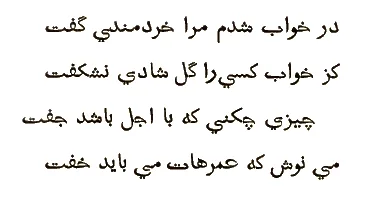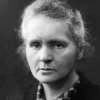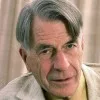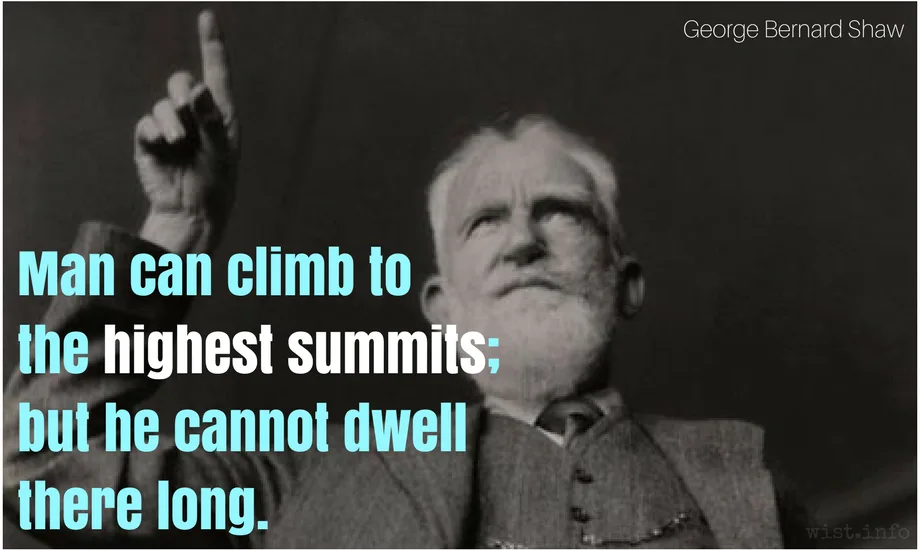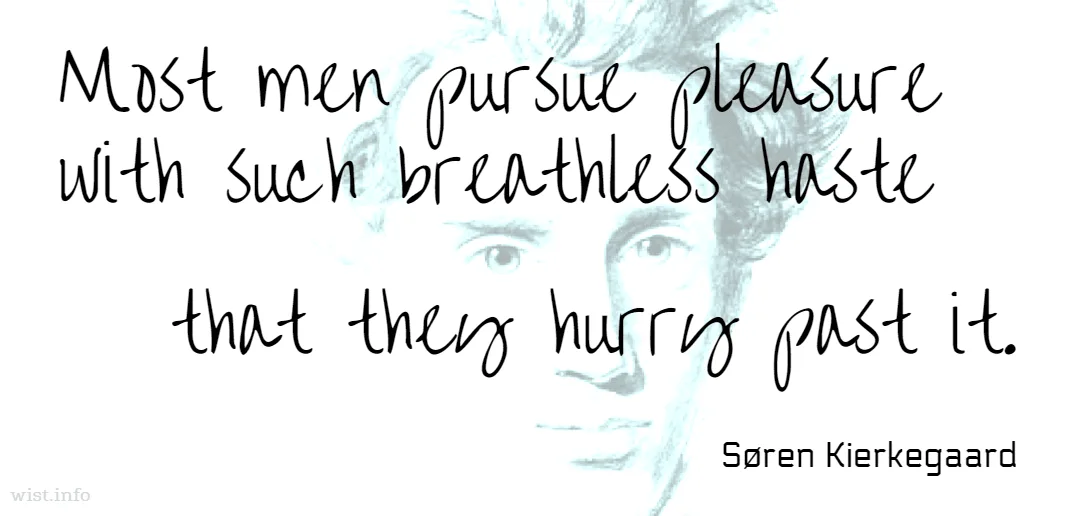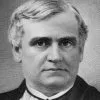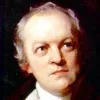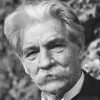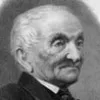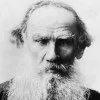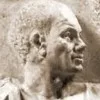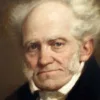I dreamt a sage said, “Wherefore life consume
In sleep? Can sleep make pleasure’s roses bloom?
For gather not with death’s twin-brother sleep,
Thou wilt have sleep enough within thy tomb!”
Omar Khayyám (1048-1123) Persian poet, mathematician, philosopher, astronomer [عمر خیام]
Rubáiyát [رباعیات], Bod. # 27 [tr. Whinfield (1883), # 51]
(Source)
Alternate translations:One night, I beheld in a dream a sage, who said to me, "In sleep, O mhy friend, the rose of joy has never blossomed for any man. Why do you do a deed so like to death? Arise, and drink wine, for you will sleep sound enough beneath the earth.
[tr. McCarthy (1879), # 47] (1888)]Last night I dreamed I met a sage who said:
"Doth e'er in sleep the rosebud lift its head?
Why sleep, for sleep is but akin to death,
And thou shalt sleep enough when thou art dead?"
[tr. Garner (1887), 91]Life is so short, yet sleeps thy lovely head;
Why make so soon a death-bed of thy bed?
O love, awake! thy beauty wastes away --
Thou shalt sleep on and on when thou art dead.
[tr. Le Gallienne (1897), # 33]In a dream of the night quoth a sage me unto:
"Rose of gladness for mortal from sleep never blew;
A thing, then, to death that akin is why do?
Up, for under the earth thou shalt slumber thy due!"
[tr. Payne (1898), # 196]I fell asleep, and wisdom said to me: --
"Never from sleep has the rose of happiness blossomed for anyone;
why do a thing that is the mate of death?
Drink wine, for thou must sleep for ages."
[tr. Heron-Allen (1898), # 27]'Twas while I slept, that thus a wise man spoke: --
"Sleep never caused joy's rose in man to bloom,
Why court you thus the fellow of death's yoke?
Drink now, you'll sleep enough in earth's dark womb."
[tr. Cadell (1899), # 16]I lay upon my couch in slumber deep,
And Wisdom cried aloud, "Oh, wherefore sleep?
For sleep is kin to death; drink while you may;
Eternal slumber hastens o'er the steep!"
[tr. Roe (1906), # 20]I dreamt that Wisdom came to me and said,
"In sleep for none joy's roses petals spread,
In life why dost thou mimic death? Arise!
For sleep thou must when 'neath earth is thy bed."
[tr. Thompson (1906), # 93]Falling asleep, I heard my Fate confess
That Sleep ne'er bore the Rose of Happiness.
"Sleep is the Mate of Death," she cried. "Awake!
Drink, ere Her lips bestow the last caress!"
[tr. Talbot (1908), # 27]I dropped asleep. A wise man said to me: "From sleep
the rose of pleasure did never bloom for anyone.
Why do you meddle with that which is of a piece
with death ? Drink wine for we must sleep during many a lifetime."
[tr. Christensen (1927), # 59]I fell asleep, and a wise man said to me:
"Sleep has brought to no one the rose of bliss.
Why do a thing which is the twin of death?
Drink wine, for many a life-time you must slumber".
[tr. Rosen (1928), # 43]In sleep I was -- A sage then told me so:
"In darkness fruit of bliss will never grow,
Arise and fight with Death, avoid his blow;
Ere long you sleep within The Pit below."
[tr. Tirtha (1941), # 7.1]I was asleep, a wise man said to me
"The rose of joy does not bloom for slumberers;
Why are you asleep? Sleep is the image of death,
Drink wine, below the ground you must sleep of necessity.
[tr. Avery/Heath-Stubbs (1979), # 159]
Quotations about:
joy
Note not all quotations have been tagged, so Search may find additional quotes on this topic.
Life is a madrigal or a dirge, according to the singer’s temperament.
Minna Antrim (1861-1950) American epigrammatist, writer
Naked Truth and Veiled Allusions (1902)
(Source)
If you want to be happy yourself, if you are truly civilized, you want others to be happy. Every man ought, to the extent of his ability, to increase the happiness of mankind, for the reason that that will increase his own. No one can be really prosperous unless those with whom he lives share the sunshine and the joy.
Robert Green Ingersoll (1833-1899) American lawyer, agnostic, orator
Speech (1886-11-14), “A Lay Sermon,” American Secular Union annual congress, Chickering Hall, New York City
(Source)
Whenever mortals fall in love,
if they should happen to meet with fine lovers,
there is no greater joy than this.[ὅσοι γὰρ εἰς ἔρωτα πίπτουσιν βροτῶν,.
ἐσθλῶν ὅταν τύχωσι τῶν ἐρωμένων,.
οὐκ ἔσθ’ ὁποίας λείπεται τόδ’ ἡδονῆς.]Euripides (485?-406? BC) Greek tragic dramatist
Andromeda [Ανδρομέδα], frag. 138 (TGF) (412 BC) [tr. Wright (2017)]
(Source)
One of the first recorded uses of the phrase "fall in love [εἰς ἔρωτα πίπτειν]."
Nauck frag. 138, Barnes frag. 24, Musgrave frag. 12. (Source (Greek)). Alternate translations:They who by love are caught, and fix their love
On virtuous objects; to complete their bliss,
Can need no new accession of delight.
[tr. Wodhall (1809)]When it befalls poor mortal men to love,
Should they find worthy objects for their loving,
There is no fuller joy on earth to long for.
[Source]
I don’t know that it’s an issue for anybody but me, but it’s true that nothing I did where the only reason for doing it was the money was ever worth it, except as bitter experience. Usually I didn’t wind up getting the money, either. The things I did because I was excited, and wanted to see them exist in reality have never let me down, and I’ve never regretted the time I spent on any of them.
Neil Gaiman (b. 1960) British author, screenwriter, fabulist
Speech (2012-05-17), Commencement, University of the Arts, Philadelphia [06:33]
(Source)
Since Joys are so uncertain; take Gladness when it comes.
Thomas Fuller (1654-1734) English physician, preacher, aphorist, writer
Introductio ad Prudentiam, Vol. 1, # 101 (1725)
(Source)
Full many various qualities distinguish
The Cyprian Goddess; both supreme delight
And sorrow she dispenses to mankind:
O may I meet with her when most propitious.
[Τῇ δ’ ‘ Αφροδίτῃ πόλλ’ ἔνεστι ποικίλα ·
τέρπει τε γὰρ μάλιστα καὶ λυπεῖ βροτούς ·
τύχοιμι δ’ αὐτῆς, ἡνίκ ̓ ἐστὶν εὐμενής .]Euripides (485?-406? BC) Greek tragic dramatist
Æolus [Αἴολος], frag. 26 (TGF) [tr. Wodhull (1809)]
(Source)
The Cyprian Goddess is Aphrodite, the goddess of love.
Nauck frag. 26, Barnes frag. 34, Musgrave frag. 10. (Source (Greek)). Alternate translations:Aphrodite has many shades:
She can please or aggrieve men completely.
[tr. @sentantiq (2015)]
Grief can take care of itself, but to get the full value of a joy you must have someone to divide it with.
Mark Twain (1835-1910) American writer [pseud. of Samuel Clemens]
Following the Equator, ch. 48, epigraph (1897)
(Source)
But the power
of a man’s will is often powerless:
laughter and tears follow so close upon
the passions that provoke them that the more
sincere the man, the less they obey his will.
[Ma non può tutto la virtù che vuole;
ché riso e pianto son tanto seguaci
a la passion di che ciascun si spicca,
che men seguon voler ne’ più veraci.]Dante Alighieri (1265-1321) Italian poet
The Divine Comedy [Divina Commedia], Book 2 “Purgatorio,” Canto 21, l. 105ff (21.105-108) (1314) [tr. Musa (1981)]
(Source)
(Source (Italian)). Alternate translations:As each alternate Passion leaves a trace
On the still-varying muscles of the face,
Fictitious oft; but, by the candid mind,
Conceal'd with pain, the dawn of dubious joy
My features wore.
[tr. Boyd (1802), st. 20]But the power which wills,
Bears not supreme control: laughter and tears
Follow so closely on the passion prompts them,
They wait not for the motions of the will
In natures most sincere.
[tr. Cary (1814)]But will is not with power entire endued.
Laughter and tears pursue so much the trace
The passion dictates that imprints them there,
Nor follow will in natures most sincere.
[tr. Bannerman (1850)]But yet the power that wills cannot do all things;
For tears and laughter are such pursuivants
Unto the passion from which each springs forth,
In the most truthful least the will they follow.
[tr. Longfellow (1867)]But virtue cannot all it would; for laughter and tears follow so much the passion from which each springs, that they least obey will in the most truthful men.
[tr. Butler (1885)]But all it wishes, will cannot forbear:
For smiles and tears to diverse passion wed,
Upon that passion follow so instinct.
In open natures, will is quite outsped.
[tr. Minchin (1885)]But the power that wills cannot do everything; for smiles and tears are such followers on the emotion from which each springs, that in the most truthful they least follow the will.
[tr. Norton (1892)]But the virtue which wills is not all powerful;
for laughter and tears follow so closely the passion from which each springs, that they least obey the will in the most truthful.
[tr. Okey (1901)]But the power to will cannot do all, for laughter and tears are so close followers on the passions from which they spring that they least follow the will in the most truthful.
[tr. Sinclair (1939)]But all is not done by the will's decree;
For on the passion wherefrom each is bred
Laughter and tears follow so close that least
In the most truthful is the will obeyed.
[tr. Binyon (1943)]But will with us is not made one with power;
Tears, laughter, tread so hard upon the heel
Of their evoking passions, that in those
Who're most sincere they least obey the will.
[tr. Sayers (1955)]But man's will
is not supreme in every circumstance:
for tears and laughter come so close behind
the passions they arise from, that they least
obey the will of the most honest mind.
[tr. Ciardi (1961)]But the power that wills cannot do everything; for smiles and tears are such close followers on the emotion from which each springs, that in the most truthful they least follow the will.
[tr. Singleton (1973)]But virtue cannot do everything that it will;
For laughter and tears follow so closely on
The passions from which they respectively proceed,
That they follow the will least in the most truthful.
[tr. Sisson (1981)]And yet the power of the will cannot do all,
for tears and smiles are both so faithful to
the feelings that have prompted them that true
feeling escapes the will that would subdue.
[tr. Mandelbaum (1982)]But the power of the will cannot do everything,
for laughter and weeping follow so closely on the passion from which each springs that they follow the will least in those who are most truthful.
[tr. Durling (2003)]But the virtue that wills is not all-powerful, since laughter and tears follow the passion, from which they spring, so closely, that, in the most truthful, they obey the will least.
[tr. Kline (2002)]But will power can't do everything it wills.
For tears and laughter follow on so close
to those emotions from which each act springs
that these least follow will in those most true.
[tr. Kirkpatrick (2007)]But the power that wills cannot do all it wills,
for laughter and tears so closely follow feelings
from which they spring, they least can be controlled
in those who are most truthful.
[tr. Hollander/Hollander (2007)]But will alone won't stop a human being,
Since laughter and tears are deeply interwoven,
Following hard on emotions which spring them forth,
And when they're truthful have little to do with the will.
[tr. Raffel (2010)]
All that [experience] really demonstrated was that our future would be the same as our past, and that the sin we had done once, and with loathing, we would do many times, and with joy.
Oscar Wilde (1854-1900) Irish poet, wit, dramatist
The Picture of Dorian Gray, ch. 4 (1891)
(Source)
The passage also occurs in ch. 3 of the original Lippincott's Monthly Magazine (1890-06) version.
As extracted into Oscariana and epigram form (e.g.), it is given in the present tense:All that it really demonstrates is that our future will be the same as our past, and that the sin we have done once, and with loathing, we shall do many times, and with joy.
So this is my wish, a wish for me as much as it is a wish for you: in the world to come, let us be brave — let us walk into the dark without fear, and step into the unknown with smiles on our faces, even if we’re faking them.
And whatever happens to us, whatever we make, whatever we learn, let us take joy in it. We can find joy in the world if it’s joy we’re looking for, we can take joy in the act of creation.
So that is my wish for you, and for me. Bravery and joy.Neil Gaiman (b. 1960) British author, screenwriter, fabulist
Blog entry (2012-12-31), “My New Year’s Wish”
(Source)
All my life through, the new sights of Nature made me rejoice like a child.
Marie Curie (1867-1934) Polish-French physicist and chemist [b. Maria Salomea Skłodowska]
Pierre Curie, “Autobiographical Notes: Marie Curie,” ch. 1 (1923) [tr. Kellogg/Kellogg]
(Source)
Giving is more joyous than receiving, not because it is a deprivation, but because in the act of giving lies the expression of my aliveness.
Erich Fromm (1900-1980) American psychoanalyst and social philosopher
The Art of Loving, ch. 2, sec. 1 (1956)
(Source)
I have known sorrow — therefore I
May laugh with you, O friend, more merrily
Than those who never sorrowed upon earth
And know not laughter’s worth.I have known laughter — therefore I
May sorrow with you far more tenderly
Than those who never guess how sad a thing
Seems merriment to one heart’s suffering.Theodosia Pickering Garrison (1874-1944) American poet
“Knowledge,” The Century Magazine (1900-08)
(Source)
Money is a singular thing. It ranks with love as man’s greatest source of joy. And with death as his greatest source of anxiety.
John Kenneth Galbraith (1908-2006) Canadian-American economist, diplomat, author
The Age of Anxiety, ch. 6 “The Rise and Fall of Money” (1977)
(Source)
Blest is the man who cheats the stormy sea
And safely moors beside the sheltering quay;
So, blest is he who triumphs over trial.
One man, by various means, in wealth or strength
Outdoes his neighbour; hope in a thousand hearts
Colours a thousand different dreams; at length
Some find a dear fulfilment, some denial.
But this I say,
That he who best
Enjoys each passing day
Is truly blest.[εὐδαίμων μὲν ὃς ἐκ θαλάσσας
ἔφυγε χεῖμα, λιμένα δ᾽ ἔκιχεν:
εὐδαίμων δ᾽ ὃς ὕπερθε μόχθων
ἐγένεθ᾽: ἑτέρᾳ δ᾽ ἕτερος ἕτερον
ὄλβῳ καὶ δυνάμει παρῆλθεν.
μυρίαι δ᾽ ἔτι μυρίοις
εἰσὶν ἐλπίδες: αἳ μὲν
τελευτῶσιν ἐν ὄλβῳ
βροτοῖς, αἳ δ᾽ ἀπέβησαν:
τὸ δὲ κατ᾽ ἦμαρ ὅτῳ βίοτος
εὐδαίμων, μακαρίζω.]Euripides (485?-406? BC) Greek tragic dramatist
Bacchæ [Βάκχαι], l. 902ff (Stasimon 3, Epode) [Chorus/Χορός] (405 BC) [tr. Vellacott (1973)]
(Source)
(Source (Greek)). Alternate translations:Blest is the man who 'scapes the stormy wave.
And in the harbour finds repose:
He too is blest, 'midst dangers brave,
Who soars above the malice of his foes:
And now these, now those possess
Superior talents or success;
Distinct their aims; but hope each bosom fires.
There are, a rich encrease who find,
The vows of some are scatter'd in the wind:
But in my judgement blest are they
Who taste, tho' only for the day.
The joys their soul desires.
[tr. Wodhull (1809)]Happy is he who has fled a storm on the sea, and reached harbor. Happy too is he who has overcome his hardships. One surpass another in different ways, in wealth or power. There are innumerable hopes to innumerable men, and some result in wealth to mortals, while others fail. But I call him blessed whose life is happy day today.
[tr. Buckley (1850)]Who hath 'scaped the turbulent sea,
And reached the haven, happy he!
Happy he whose toils are o'er
In the race of wealth and power!
This one her, and that one there,
Passes by, and everywhere
Still expectant thousands over
Thousands hopes are seen to hover,
Some to mortals end in bliss;
Some have already fled away:
Happiness alone is his
That happy is to-day.
[tr. Milman (1865)]Happy he, who from the storm,
Has the breaker escaped, and the harbour has reached;
Happy he who after toil
Is the victor, for many the ways in which man
Wins him power, and wins him wealth.
Thousand-fold ever to thousands of men,
Hope follows upon hope,
With some it grows unceasingly,
With some it wastes to nothingness.
But he whose life is ever fresh,
Lives in unbroken happiness.
[tr. Rogers (1872), l. 865ff.]Happy is he who hath escaped the wave from out the sea, and reached the haven; and happy he who hath triumphed o’er his troubles; though one surpasses another in wealth and power; yet there be myriad hopes for all the myriad minds; some end in happiness for man, and others come to naught; but him, whose life from day to day is blest, I deem a happy man.
[tr. Coleridge (1891)]Blest who from ravening seas
Hath 'scaped to haven-peace,
Blest who hath triumphed in endeavour's toil and throe.
This man to higher height
Attains, of wealth, of might,
Than that; yet myriad hopes in myriad hearts still glow:
To fair fruition brought
Are some, some come to nought:
Happy is he whose bliss from day to day doth grow.
[tr. Way (1898)]Happy he, on the weary sea
Who hath fled the tempest and won the haven.
Happy whoso hath risen, free,
Above his striving. For strangely graven
Is the orb of life, that one and another
In gold and power may outpass his brother.
And men in their millions float and flow
And seethe with a million hopes as leaven;
And they win their Will, or they miss their Will,
And the hopes are dead or are pined for still;
But whoe'er can know,
As the long days go,
That To Live is happy, hath found his Heaven!
[tr. Murray (1902)]-- Blessèd is he who escapes the storm at sea,
who comes home to his harbor.
-- Blessèd is he who emerges from under affliction.
-- In various ways one man outraces another in the race for wealth and power.
-- Ten thousand men possess ten thousand hopes.
-- A few bear fruit in happiness; the others go awry.
-- But he who garners day by day the good of life, he is happiest. Blessèd is he.
[tr. Arrowsmith (1960)]Happy the man who from the sea
escapes the storm and finds harbor;
happy he who has surmounted
toils; and in different ways one surpasses another
in prosperity and power.
Besides this, for countless men there are countless
hopes -- some of them
reach to the end in prosperity
for mortals, and others depart;
but him whose life day by day
is happy do I count blessed.
[tr. Kirk (1970)]Happy he from the sea escaping
out of the storm, arriving at anchorage;
happy he fleeing labour's straining;
in many manners may men surpass other men
in prosperity and in power.
Thousand-fold upon thousand-fold
hopes come crowding upon us,
and some finally prosper
for mortals, some are vanish'd:
who day by day has a livelihood of happiness, he is blessed
[tr. Neuburg (1988)]Happy the man who withstands
life's assaults.
Somehow, in some way, some man surpasses some other
in position and fortune.
For millions of men there are millions of hopes.
For some, these ripen into happiness,
for others into nothing.
Count lucky the man who is happy on this one day.
[tr. Cacoyannis (1982)]That man is blessed who fled the storm
At sea and reached the bay.
And he is blessed who rose above
His toil. In various ways
One man outstrips in wealth and power
Another: countless men
Have countless hopes: some end in joy,
But others drift way.
The man who day to day has luck
In life -- that man I bless.
[tr. Blessington (1993)]Happy the man who escapes
the storm at sea and reaches harbor.
Happy, too, is he who overcomes
his toils. And in different ways one man
surpasses another in prosperity and power.
Besides, countless are the hopes
of countless men, Some of those hopes
end in prosperity for mortals, others vanish.
But I count him blessed whose life,
from day to day, is happy.
[tr. Esposito (1998)]Happy the man who has come away
safe on the beach from a storm at sea,
happy the man who has risen above
trouble and toil. Many are the ways
one man may surpass another
in wealth or power,
and beyond each hope there beckons another
hope without number.
Hope may lead a man to wealth,
hope may pass away;
but I admire a man when he
is happy in an ordinary life.
[tr. Woodruff (1999)]Happy is he who escapes
A storm at sea and finds safe harbor.
Happy is he who has risen above
Great toils. In different ways,
Some persons outdo others
In their wealth and power.
And hopes are as many as those who hope --
Some will end in rich reward, others in nothing.
But those whose lives are happy
Day by day -- those
I call the blesséd.
[tr. Gibbons/Segal (2000)]Blessed is he that out of the sea
escapes the storm and wins the harbor;
blessed he who triumphs over
trouble: one man surpasses another
in respect to wealth or power.
Furthermore, in countless hearts
there live countless hopes, some
ending in good fortune,
though some vanish away.
But the man whose life today is happy,
him I count blessed.
[tr. Kovacs (2002)]Joy of the storm endured,
And the harbour safely reached.
Joy of hardship overcome.
Joy of striving for wealth and power.
Joy of hope. Joy of dreams,
Fulfilled or unfulfilled.
And most blessed they who takes their joy
In the simple detail of the day by day --
[tr. Teevan (2002)]Happy is the man who has escaped the storms of life’s angry seas and found a harbour; and happy is the man who have endured those storms.
Men are infinite in number and their hopes have no end and some of these hopes bring joy to some and nothing to others.
I say blessed is the man whose life has been happy -- so far.
These are useful pieces of advice. True wisdom.
[tr. Theodoridis (2005)]Blessed is the one who's fled the
Storm at sea and come to harbour;
And happy is he who rises above
Hardships; for one may sur-
Pass another in wealth or in power,
But these are a lot hopes to a lot of
Different people; and many end in
Happiness while others fail mis’rably
But the one who's happy day-to-day,
Is the one who's truly blessed.
[tr. Valerie (2005)]Whoever has escaped a storm at sea
is a happy man in harbour,
whoever overcomes great hardship
is likewise another happy man.
Various men outdo each other
in wealth, in power,
in all sorts of ways.
The hopes of countless men
are infinite in number.
Some make men rich;
some come to nothing,
So I consider that man blessed
who lives a happy life
existing day by day.
[tr. Johnston (2008), l. 1106ff]Lucky is the man who escapes a storm at sea
and finds his way home to safe harbour --
the man delivered from hardship.
We all compete for wealth and power,
and for every thousand hearts a thousand hopes.
Some wither, some bear fruit.
But the one who lives from day to day,
finding good where he can:
he is happy --
he is a lucky man.
[tr. Robertson (2014)]Fortunate is the one who flees
The swell of the sea and returns to harbor.
Fortunate is the one who survives through troubles.
One is greater than another in different things,
He surpasses in fortune and power --
But in numberless hearts still
Are numberless hopes: some result
In good fortune, but other mortal dreams
Just disappear.
Whoever has a happy life to-day,
I consider fortunate.
[tr. @sentantiq (2018)]Happy is the one who escapes a sea-storm
and comes home to the harbor.
And happy is the one who stands against their hardships.
Happy are they who endure.
One man may exceed another, in his own way.
In wealth.
In power.
Countless hopes for yet-more-countless people.
Sometimes hope wins out, gives us riches --
And sometimes it doesn’t. Sometimes we fail.
But the one who can live in spite of this,
who is happy day to day.
That one is blessed.
[tr. Pauly (2019)]Blessed is the one who finds a harbour safe from the winter sea. Blessed is the one who travels beyond affliction. Blessed is the one who wins great joy. Numberless more have their dreams. Some hopes are fulfilled, some vanish. Whoever lives happily from day to day I bless.
[tr. Behr/Foster (2019)]Fortunate [eudaimōn] is he who has fled a storm on the sea and reached harbor. Eudaimōn too is he who has overcome his toils. Different people surpass others in various ways, be it in wealth [olbos] or in power. Mortals have innumerable hopes, and some come to telos in prosperity [olbos], while others fail. I deem him blessed whose life is eudaimōn day by day.
[tr. Buckley/Sens/Nagy (2020)]
Some people laughed to see the alteration in him, but he let them laugh, and little heeded them; for he was wise enough to know that nothing ever happened on this globe, for good, at which some people did not have their fill of laughter in the outset; and knowing that such as these would be blind anyway, he thought it quite as well that they should wrinkle up their eyes in grins, as have the malady in less attractive forms. His own heart laughed: and that was quite enough for him.
Charles Dickens (1812-1870) English writer and social critic
A Christmas Carol, Stave 5 “The End of It” (1843)
(Source)
Ah, shall my white feet in the dances gleam
The livelong night again? Ah, shall I there
Float through the Bacchanal’s ecstatic dream,
Tossing my neck into the dewy air? —
Like to a fawn that gambols mid delight
Of pastures green.[ἆρ᾽ ἐν παννυχίοις χοροῖς
θήσω ποτὲ λευκὸν
πόδ᾽ ἀναβακχεύουσα, δέραν
865εἰς αἰθέρα δροσερὸν ῥίπτουσ᾽,
ὡς νεβρὸς χλοεραῖς ἐμπαί-
ζουσα λείμακος ἡδοναῖς]Euripides (485?-406? BC) Greek tragic dramatist
he 1 [Chorus/Χορός] (405 BC) [tr. Way (1898)]
(Source)
(Source (Greek)). Alternate translations:When shall I join the midnight dance,
With agile step my comrades lead,
And as our festive choirs advance
Triumphant over enaml'd mead,
My heaving bosom to the dewy gale
Expand, high bounding like a fawn
Who gambols o'er the verdant lawn.
[tr. Wodhull (1809)]Shall I move my white foot in the night-long dance, aroused to a frenzy, throwing my head to the dewy air, like a fawn sporting in the green pleasures of the meadow.
[tr. Buckley (1850)]O when, through the long night,
With fleet foot glancing white,
Shall I go dancing in my revelry,
My neck cast back, and bare
Unto the dewy air,
Like sportive fawn in the green meadow's glee?
[tr. Milman (1865)]Then shall it be that all night long
My feet shall hurry through the dance,
Then shall I in new jollity
Toss to the dewy breeze my neck,
As jocund as the tender fawn
Who sports athwart the grassy mead.
[tr. Rogers (1872), l. 823ff]Will this white foot e’er join the night-long dance? what time in Bacchic ecstasy I toss my neck to heaven’s dewy breath, like a fawn, that gambols ’mid the meadow’s green delights.
[tr. Coleridge (1891)]Will they ever come to me, ever again,
The long long dances,
On through the dark till the dim stars wane?
Shall I feel the dew on my throat, and the stream
Of wind in my hair? Shall our white feet gleam
In the dim expanses?
Oh, feet of a fawn to the greenwood fled,
Alone in the grass and the loveliness.
[tr. Murray (1902)]When shall I dance once more
with bare feet the all-night dances,
tossing my head for joy
in the damp air, in the dew,
as a running fawn might frisk
for the green joy of the wide fields.
[tr. Arrowsmith (1960)]Shall I in night-long dances
ever set white
foot in bacchic celebration, hurling
my throat to the dewy air of heaven,
like a fawn playing in the green
pleasures of a meadow?
[tr. Kirk (1970)]O for long nights of worship, gay
With the pale gleam of dancing feet,
With head tossed high to the dewy air --
Pleasure mysterious and sweet!
O for the joy of a fawn at play
In the fragrant meadow's green delight.
[tr. Vellacott (1973)]I seek release to as calm
of green hills, white thighs
Flashing in the grass
The dew-soaked air kissing my throat.
[...]
But gently, as the dance of the young deer, swathed
In emerald meadow.
[tr. Soyinka (1973)]In the nocturnal choruses
shall I ever set my stepping
in bacchanti sing, to toss my throat into the dewy sky?
like a frolicking fawn in the greening joy of the meadowland?
[tr. Neuburg (1988)]When, oh when,
in an all-night trance
shall I dance again,
bare feet flashing, head rushing
through the coolness of leaves,
like a fawn that frolics
in the green delights of the forest.
[tr. Cacoyannis (1982)]Will I set my bare foot
Then in dancing vigils
Rousing bacchic frenzy,
Shake my throat in the dewy air,
Like a fawn in green joy
Sporting in a meadow?
[tr. Blessington (1993)]Shall I ever move
my white feet in the all-night dances
breaking forth into Bacchic frenzy
tossing my neck back
into the dewy air
like a fawn sporting amid the green delights of the meadow?
[tr. Esposito (1998)]To dance the long night!
Shall I ever set my white foot
so, to worship Bacchus?
Toss my neck to the dewy skies
as a young fawn frisks
in green delight of pasture?
[tr. Woodruff (1999)]Will I ever celebrate
All night with white foot
Flashing in the Bakkhic dance?
Well I ever fling back
My head and let the air
Of heaven touch my throat
With dew, like a fawn at play
In the green joy of meadows?
[tr. Gibbons/Segal (2000), l. 884ff]Shall I ever in the nightlong dances
move my white feet
in ecstasy? Shall I toss
my head to the dewy heaven
like a fawn that plays
amid green meadow delights?
[tr. Kovacs (2002)]Soon shall we know again
The night-long dance,
Silver moonlit feet,
Head, in bliss, flung back
To the icy air.
A fawn at play in meadows.
[tr. Teevan (2002)]I wish!
I wish that one day I’d be able to take part in the Bacchic dances, those all night dances of joy!
I wish that one day I’d be able to see my white feet kick high to the rhythm of those dances!
And
I wish that one day I could rush with my fawn skin through the cool breeze like a fawn does.
[tr. Theodoridis (2005)]Shall I ever in nightlong dances
Shake my fair white foot
in Bacchus' madness, tossing my
Hair to the nightwind of heav'n?
Like a fawn frolicking races
through green meadow pastures ....
[tr. Valerie (2005)]O when will I be dancing,
leaping barefoot through the night,
flinging back my head in ecstasy,
in the clear, cold, dew-fresh air --
like a playful fawn celebrating
its green joy across the meadows.
[tr. Johnston (2008), l. 1060ff]Shall I dance them again, the nightlong dances?
Dance again with bare feet in the dew?
Shall I toss my head and skip through the open fields
as a fawn slipped free ...?
[tr. Robertson (2014)]Am I to dance?
To lift my feet the whole night through
with the frenzy of a god inside me?
Shall I bare my throat to the dewy air
like a fawn at play in the meadow,
where joy is green and wide?
[tr. Pauly (2019)]Shall I soon be free again to dance, to toss my head all night in the dew-filled air? Like a fawn [...] playing in the green joy of a meadow.
[tr. Behr/Foster (2019)]Shall I ever, in choruses that last all night long,
set in motion my gleaming white
foot in a Bacchic revel as I thrust my throat
toward the upper air wet with dew, yes, thrusting it forward.
-- just like a fawn playfully
skipping around in the green delights of a meadow
[tr. Buckley/Sens/Nagy (2020)]
Hard work is a prison sentence only if it does not have meaning. Once it does, it becomes the kind of thing that makes you grab your wife around the waist and dance a jig.
Malcolm Gladwell (b. 1963) Anglo-Canadian journalist, author, public speaker
Outliers: The Story of Success, Part 1, ch. 5, sec. 10 (2008)
(Source)
He’s the one who gives us wine to ease our pain.
If you take wine away, love will die, and
every other source of human joy will follow.[τὴν παυσίλυπον ἄμπελον δοῦναι βροτοῖς.
οἴνου δὲ μηκέτ᾽ ὄντος οὐκ ἔστιν Κύπρις
οὐδ᾽ ἄλλο τερπνὸν οὐδὲν ἀνθρώποις ἔτι.]Euripides (485?-406? BC) Greek tragic dramatist
Bacchæ [Βάκχαι], l. 772ff [First Messenger/Ἄγγελος] (405 BC) [tr. Woodruff (1999)]
(Source)
Speaking of Dionysus. (Source (Greek)). Alternate translations:He, the grape, that med'cine for our cares,
Bestow'd on favour'd mortals. Take away
The sparkling Wine, fair Venus smiles no more
And every pleasure quits the human race.
[tr. Wodhull (1809)]He gives to mortals the vine that puts an end to grief. Without wine there is no longer Aphrodite or any other pleasant thing for men.
[tr. Buckley (1850)]He hath given the sorrow-soothing vine to man
For where wine is not love will never be,
Nor any other joy of human life.
[tr. Milman (1865)]He gives the soothing vine
Which stills the sorrow of the human heart;
Where wine is absent, love can never be;
Where wine is absent, other joys are gone.
[tr. Rogers (1872), l. 732ff]’Twas he that gave the vine to man, sorrow’s antidote. Take wine away and Cypris flies, and every other human joy is dead.
[tr. Coleridge (1891)]He gave men the grief-assuaging vine.
When wine is no more found, then Love is not,
Nor any joy beside is left to men.
[tr. Way (1898)]This is he who first to man did give
The grief-assuaging vine. Oh, let him live;
For if he die, then Love herself is slain,
And nothing joyous in the world again!
[tr. Murray (1902)]It was he,
or so they say, who gave to mortal men
the gift of lovely wine by which our suffering
is stopped. And if there is no god of wine,
there is no love, no Aphrodite either,
nor other pleasures left to men.
[tr. Arrowsmith (1960)]They say that he
has given to men the vine that ends pain.
If wine were no more, then Cypris is no more
nor anything else delighted for mankind.
[tr. Kirk (1970)]It was he who gave men the gift of the vine as a cure for sorrow. And if there were no more wine, why, there's an end of love, and of every other pleasure in life.
[tr. Vellacott (1973)]Didn't he make us
Mortal men the gift of wine? If that is true
You have much to thank him for -- wine makes
Our labors bearable. Take wine away
And the world is without joy, tolerance, or love.
[tr. Soyinka (1973)]The sorrow-ceasing vine he gives to mortals.
Without wine there is no Aphrodite,
nor longer any other delight for men.
[tr. Neuburg (1988)]It was he,
so they say, who gave to us, poor mortals, the gift of wine,
that numbs all sorrows.
If wine should ever cease to be,
then so will love.
No pleasures left for men.
[tr. Cacoyannis (1982)]He himself, I hear them say,
Gave the pain-killing vine to men.
When wine is no more, neither is love.
Nor any other pleasure for mankind.
[tr. Blessington (1993)]He gave to mortals the vine that stops pain.
If there were no more wine, then there is no more Aphrodite
nor any other pleasure for mankind.
[tr. Esposito (1998)]It's he who gave
To mortals the vine that stops all suffering.
Adn if wine were to exist no longer, then
Neither would the goddess Aphrodite,
Nor anything of pleasure for us mortals.
[tr. Gibbons/Segal (2000), l. 885ff]He gave to mortals the vine that puts an end to pain. If there is no wine, there is no Aphrodite or any other pleasure for mortals.
[tr. Kovacs (2002)]Besides, he's given us the gift of wine,
Without which man desires nor endures not.
[tr. Teevan (2002)]He’s the god who brought the wine to the mortals. Great stuff that. It stops all sadness. Truth is, my Lord, when the wine is missing so does love and then… well, then there’s nothing sweet left for us mortals.
[tr. Theodoridis (2005)]He is the one who gave us the vine that gives
pause from pain; and if there is no wine, there'll be no more
Aphrodite, & there is no other gift to give such pleasure to us mortals.
[tr. Valerie (2005)]He gives to mortal human beings that vine which puts an end to human grief. Without wine, there's no more Aphrodite -- or any other pleasure left for men.
[tr. Johnston (2008)]He is great in so many ways -- not least, I hear say,
for his gift of wine to mortal men.
Wine, which puts an end to sorrow and to pain.
And if there is no wine, there is no Aphrodite,
And without her no pleasure left at all.
[tr. Robertson (2014)]When wine is gone, there is no more Cypris,
nor anything else to delight a mortal heart.
[tr. @sentantiq/Robinson (2015)]He gave mortals the pain-pausing vine.
When there is no wine, Cypris is absent,
And human beings have no other pleasure.
[tr. @sentantiq (2015)]I’ve heard he gave the grapevine to us mortals, as an end to pain.
And without wine, we’ve got no chance with Aphrodite. Or anything else good, for that matter.
[tr. Pauly (2019)]He even gives to mortals the grape that brings relief from cares. Without wine there is no longer Kypris or any other delightful thing for humans.
[tr. Buckley/Sens/Nagy (2020)]He gave mortals the pain-relieving vine.
But when there is no more wine, there is no Aphrodite
Nor any other pleasure left for human beings.
[tr. @sentantiq (2021)]
There’s not a joy the world can give like that it takes away.
A cheerful life is what the Muses love,
A soaring spirit is their prime delight.William Wordsworth (1770-1850) English poet
“From the Dark Chambers of Dejection Freed,” ll. 13-14 (1814)
(Source)
Life brings no greater grief
Than happiness remembered in a time
Of sorrow.[Nessun maggior dolore
Che ricordarsi del tempo felice
Ne la miseria.]Dante Alighieri (1265-1321) Italian poet
The Divine Comedy [Divina Commedia], Book 1 “Inferno,” Canto 5, l. 121ff (5.121-123) [Francesca] (1309) [tr. James (2013), l. 141ff]
(Source)
Francesca de Rimini is responding to Dante's request to speak of her love affair while in the middle of being punished for it. It is a true (if slanted) tale that occurred when Dante was a young man. Francesca da Polenta wed the crippled Giovanni Malatesta de Rimini, but fell in adulterous love with his brother, Paolo. Upon discovery of their affair, Giovanni killed them both. This was a local scandal, and would have been lost to time if Dante had not recorded it here. He relegates the lovers to the "least" eternal punishment in Hell, in the circle of carnal sins -- while Giovanni (who was still alive when this was written) is doomed to a lower circle for the murder (treachery to kindred). (More info.)
Inspiration for this particular phrase has been credited to many sources: Wisdom 11:11-12, Boethius (Consolation of Philosophy, 2.4.3-6), and Pindar (Pythian 4.510-512) are the most common. Augustine (Confessions 10.14) and Thomas Aquinas have also been cited.
(Source (Italian)). Alternate translations:No greater grief assails us [...]
Than in unhappy hours to recollect
A better time.
[tr. Rogers (1782)]Oh! how grievous to relate
Past joys, and tread again the paths of fate.
[tr. Boyd (1802), st. 23]No greater grief than to remember days
Of joy, when mis'ry is at hand!
[tr. Cary (1814)]No keener pang hath hell.
Than to recall, amid some deep distress,
Our happier time.
[tr. Dayman (1843)]There is no greater pain than to recall a happy time in wretchedness.
[tr. Carlyle (1849)]There is no greater grief
Than to remember happiness in woe.
[tr. Bannerman (1850)]No greater grief than this,
Mem'ry to hold of the past happy time
In misery.
[tr. Johnston (1867)]There is no greater sorrow
Than to be mindful of the happy time
In misery.
[tr. Longfellow (1867)]No greater woe is there than to call to mind the happy time in your misery.
[tr. Butler (1885)]There is no greater grief
Than to remember us of happy time
In misery.
[tr. Minchin (1885)]There is no greater woe than in misery to remember the happy time.
[tr. Norton (1892)]No deeper sorrow is, than to recall a time of happiness, in misery's hour.
[tr. Sullivan (1893)]There is no greater sorrow
Than to recall to memory times of gladness
In misery.
[tr. Griffith (1908)]There is no greater pain than to recall the happy time in misery.
[tr. Sinclair (1939)]No grief surpasses this [...]
In the midst of misery to remember bliss.
[tr. Binyon (1943)]The bitterest woe of woes
Is to remember in our wretchedness
Old happy times.
[tr. Sayers (1949)]The double grief of a lost bliss
is to recall its happy hour in pain.
[tr. Ciardi (1954), ll. 118-19]There is no greater sorrow than to recall, in wretchedness, the happy time.
[tr. Singleton (1970)]There is no greater pain
than to remember, in our present grief,
past happiness!
[tr. Musa (1971)]There is no greater sorrow
than thinking back upon a happy time
in misery.
[tr. Mandelbaum (1980)]There is no greater sorrow
Than to think backwards to a happy time,
When one is miserable.
[tr. Sisson (1981)]No sadness
Is greater than in misery to rehearse
Memories of joy.
[tr. Pinsky (1994), l. 107ff]There is no greater pain than to remember the happy time in wretchedness.
[tr. Durling (1996)]There is no greater pain, than to remember happy times in misery.
[tr. Kline (2002)]There is no greater pain, I fear,
than to recall past joy in present hell.
[tr. Carson (2002)]There is no sorrow greater
than, in times of misery, to hold at heart
the memory of happiness.
[tr. Kirkpatrick (2006)]There is no greater sorrow
than to recall our time of joy
in wretchedness.
[tr. Hollander/Hollander (2007)]No sadness afflicts the heart
More than recalling, in times of utter disaster,
Sweetened days in which we knew no darkness.
[tr. Raffel (2010)]What's sadder than remembering
The happy past when you're feeling wretched?
[tr. Bang (2012)]
Death is an endless night so awful to contemplate that it can make us love life and value it with such passion that it may be the ultimate cause of all joy and all art.
Paul Theroux (b. 1941) American novelist and travel writer
“D is for Death,” Hockney’s Alphabet (1991) [ed. Stephen Spender]
(Source)
What moment of ecstasy equals that one in childhood when, after having just been given permission to “go play” with a chum, you are on your way!
Marcelene Cox (1900-1998) American writer, columnist, aphorist
“Ask Any Woman” column, Ladies’ Home Journal (1963-03)
(Source)
And the host laughed and wept, and in the midst of their merriment and tears the clear voice of the minstrel rose like silver and gold, and all men were hushed. And he sang to them, now in the Elven-tongue, now in the speech of the West, until their hearts, wounded with sweet words, overflowed, and their joy was like swords, and they passed in thought out to regions where pain and delight flow together and tears are the very wine of blessedness.
J.R.R. Tolkien (1892-1973) English writer, fabulist, philologist, academic [John Ronald Reuel Tolkien]
The Lord of the Rings, Vol. 3: The Return of the King, Book 6, ch. 4 “The Field of Cormallen” (1955)
(Source)
A soiled baby, with a neglected nose, cannot be conscientiously regarded as a thing of beauty; and inasmuch as babyhood spans but three short years, no baby is competent to be a joy “forever.”
Mark Twain (1835-1910) American writer [pseud. of Samuel Clemens]
“Answers to Correspondents,” Sketches New and Old (1875)
(Source)
Ostensibly in response to a "Young Mother" who had written that her new baby was a thing of beauty and a joy forever.
When you jump for joy, beware that no one moves the ground from beneath your feet.
[Gdy z radości podskoczysz do góry, uważaj, by ci ktoś ziemi spod nóg nie usunął.]
Stanislaw Lec (1909-1966) Polish aphorist, poet, satirist
Unkempt Thoughts [Myśli nieuczesane] (1957) [tr. Gałązka (1962)]
(Source)
The things that make a life of ease,
Dear Martial, are such things as these:
Wealth furnished not by work but birth,
A grateful farm, a blazing hearth,
No lawsuit, seldom formal dress;
But leisure, stalwart healthiness,
A tactful candour, equal friends,
Glad guests at board which naught pretends,
No drunken nights, but sorrow free,
A bed of joy yet chastity;
Sleep that makes darkness fly apace,
So well content with destined place,
Unenvious so as not to fear
Your final day, nor wish it near.[Vitam quae faciant beatiorem,
Iucundissime Martialis, haec sunt:
Res non parta labore, sed relicta;
Non ingratus ager, focus perennis;
Lis numquam, toga rara, mens quieta;
Vires ingenuae, salubre corpus;
Prudens simplicitas, pares amici;
Convictus facilis, sine arte mensa;
Nox non ebria, sed soluta curis;
Non tristis torus, et tamen pudicus;
Somnus, qui faciat breves tenebras:
Quod sis, esse velis nihilque malis;
Summum nec metuas diem nec optes.]Martial (AD c.39-c.103) Spanish Roman poet, satirist, epigrammatist [Marcus Valerius Martialis]
Epigrams [Epigrammata], Book 10, epigram 47 (10.47) (AD 95, 98 ed.) [tr. Duff (1929)]
(Source)
To his friend, Julius Martialis. (Source (Latin)). Alternate translations:Martial, the things that do attain
The happy life, be these, I find:
The riches left, not got with pain;
the fruitful ground, the quiet mind:
the equal friend, no grudge, no strife;
No charge of rule, nor governance;
Without disease, the healthful life;
The household of continuance:
The mean diet, no delicate fare;
True wisdom join'd with simpleness;
The night discharged of all care,
Where wine the wit may not oppress:
The faithful wife, without debate;
Such sleeps as may beguile the night.
Contented with thine own estate;
Ne wish for Death, ne Fear his might.
[tr. Henry Howard, Earl of Surrey (1557)]The Things that make the happier life, are these,
Most pleasant Martial; Substance got with ease,
Not labour'd for, but left thee by thy Sire;
A Soyle, not barren, a continewall fire;
Never at law; seldome in office gown'd;
A quiet mind; free powers; and body sound;
A wise simplicity; freindes alike-stated;
Thy table without art, and easy-rated:
Thy night not dronken, but from cares layd wast;
No sowre, or sollen bed-mate, yet a Chast;
Sleepe, that will make the darkest howres swift-pac't;
Will to bee, what thou art; and nothing more:
Nor feare thy latest day, nor wish therfore.
[tr. Jonson (1640)]The things that make a life to please
(Sweetest Martiall), they are these:
Estate inherited, not got:
A thankful field, hearth always hot:
City seldom, law-suits never:
Equal friends agreeing ever:
Health of body, peace of mind:
Sleeps that till the morning bind:
Wise simplicity, plain fare:
Not drunken nights, yet loosed from care:
A sober, not a sullen spouse:
Clean strength, not such as his that plows;
Wish only what you are, to be;
Death neither wish, nor fear to see.
[tr. Fanshawe (1648)]Those things which make life truly blest,
Sweetest Martial hear exprest:
Wealth left, and not from Labour growing;
A gratefull soyl, a Hearth still glowing;
No Strife, small Business, Peace of Mind,
Quick Wit, a Body well inclin'd,
Wise Innocence, Friends of one Hart,
Cheap Food, a Table without Art;
Nights which nor Cares, nor Surfets know,
No dull, yet a chaste Bedfellow;
Sleeps which the tedious Hours contract;
Be what thou mayst be, nor exact
ought more; nor thy last Hour of Breath
Fear, nor with wishes hasten Death.
[tr. Sherburne (1651)]Most pleasant Martial these are they
That make the happyer life and day,
Means not sweat for, but resign'd,
Fire wihtout end, fields still in kinde,
No strife, no office, inward peace,
Free strength, a body sans disease,
A prudent plainesse, equal friends,
Cheap Cates, not scraped from the world's ends,
A night not drown'd, but free from care,
Sheets never sad, and yet chast are,
Sleep that makes hsort the shades of night,
Art such thou would'st be, if there might
A choice be offer'd, nor dost fear
Nor wish thy last dayes exit here.
[tr. Fletcher (1656)]Since, dearest Friend! 'tis your desire to see
A true receipt of happiness from me;
These are the chief ingredients, if not all:
Take an estate neither too great, nor small
Which quantum sufficit the doctors call.
Let this estate from parents' care descend;
The getting it too much of life does spend.
Take such a ground, whose gratitude may be
A fair encouragement for industry.
Let constant fires the winter's fury take,
And let thy kitchen's be a vestal flame.
Thee to the town let never suit at law,
And rarely, very rarely, business draw.
They active mind in equal temper keep,
in undisturbed peace, yet not in sleep.
Let exercise a vigorous health maintain,
Without which all the composition's vain.
In the same weight prudence and innocence take;
And of each does the just mixture make.
But a few friendships wear, and let them be
By nature and by fortune fit for thee.
Instead of art and luxury in food,
Let mirth and freedom make thy table good.
If any cares into the daytime creep,
At night, without wine's opium, let them sleep,
Let rest, which nature does to darkness wed,
And not lust, recommend to thee thy bed.
Be satisfied, and pleas'd with what thou art;
Act cheerfully and well th' allotted part;
Enjoy the present hour, be thankful for the past,
And neither fear, nor with th' approaches of the last.
[tr. Cowley (1656)]What things our Life do happy make
From me, my sweetest Martial, take.
A left Estate, not got with pain;
A fruitfull Field, that swells with grain;
A Kitching, that is ever warm;
Life free from Quarrels and from Harm.
Rarely to be concern;d with State,
Never to have Law-sutes , or debate;
But on the Mind Content to wait.
The Strength intire and Body sound,
And Innocence with Prudence crown'd:
An Equal and a Faithfull Friend,
Discourse, that may in Pleasure end,
Nor Feasts, that may to Riot tend.
No drunken Nights, yet such, as may
Wash off the sully of the Day.
No lonely Bed, yet One, that's chast;
And Sleep, that tedious Nights may wast.
With what we have to be Content,
Nor, what we have not, to resent:
Not fear our last approaching Day,
And yet not rashly fling our Life away.
[tr. Heyrick (1691)]To make my life of all mens happyest,
Sweet Martiall, I w'ld bee wit these things blest:
A good Estate, nott gott with mine own toyle,
But by Descent: plac'd in a fruitfull soyle:
Well woodded, that may constant fyres mayntayne:
No private Suites: few publicke Cares: A Brayne
Untroubled: Body healthfull; active, strong;
Harmeless, butt prudent, in converse; among
Few friends of my owne rank: No curious Fare,
Butt wholesome: Nights, nott drunke, butt free from Care
A Wife though chast yett frolick in my Bedd:
Sound sleepe all Night to seize my drowsy head;
Wish to bee what thou art, and wish no higher:
And thy last End nor feare, nor yett desire.
[British Library MS Add. 27343 (17th C)]Pleas'd alway with the lot my fates assign,
Let me no change desire, no change decline;
With every turn of Providence comply,
Not tir'd with life, nor yet afraid to die.
[tr. Fenton (c. 1725)]Of things that heighten human bliss,
The sum, sweet Martial, may be this.
A freehold, not amast by care;
But dropt on a deserving heir:
A soil, that ev'ry culture pays,
A hearth, with never-dying blaze:
No contest, and but little court;
A quiet mind, her own support:
A gale, to fan ingenuous flame;
Exertion, to enforce the frame:
Simplicity, that wisdom blends;
Equality, the bond of friends:
An easy converse, artless board,
With all the little needfull stor'd:
A night not soaking, care effac'd;
A couch not dismal, always chaste:
Sleep stealing o'er the gloom so sweet,
That evening bids and morning meet.
content, which nought beyond aspires;
And death nor dreads, nor yet desires.
[tr. Elphinston (1782), 2.47]Pleas'd with thy present lot, not grudging at the past
Nor fearing when thy time shall come, nor hoping for thy last.
[tr. Somerville (<1858)]The requisites for a happy life are the following: competency inherited and not acquired by labour; productive land, a hearth with never lacks a fire; total absence of litigation; rare occasion for the toga; a quiet mind; unimpaired physical vigour; health of body; prudent simplicity; friends that are, in all respects, your equal; familiar society; a table devoid fo art; nights, not of revelling, but of freedom from cares; a couch not sad nor licentious; sleep, which curtails the time of darkness; to be exactly what you wish to be; preferring no other condition to your own; neither to dread nor to long for your last hour.
[tr. Amos (1858); includes a variety of commentary]The things that make life happy, dearest Martial, are these: wealth not gained by labour, but inherited; lands that make no ill return; a hearth always warm; freedom from litigation; little need of business costume; a quiet mind; a vigorous frame; a healthy constitution; prudence without cunning; friends among our equals, and social intercourse; a table spread without luxury; nights, not of drunkenness, yet of freedom from care; a bed, not void of connubial pleasures, yet chaste; sleep, such as makes the darkness seem short; contentment with our lot, and no wish for change; and neither to fear death nor seek it.
[tr. Bohn's Classical (1859)]What makes the happiest life below,
A few plain rules, my friend, will show.
A good estate not earn'd with toil,
But left by will, or giv'n by fate;
A land of no ungrateful soil,
A constant fire within your grate:
No law; few cares; a quiet mind;
Strength unimpair'd, a healthful frame;
Wisdom with innocence combin'd;
Friends equal both in years and fame;
Your living easy, and your board
With food, but not with luxury stored
A Bed, though chaste, not solitary;
Sound sleep, to shorten night's dull reign;
Wish nothing that is yours to vary;
Think all enjoyments that remain;
And for the inevitable hour,
Nor hope it nigh, nor dread its power.
[tr. Merivale (<1871)]These, Martial, are the things that give
A happier life than most men live.
A fortune not by labour on,
But left by father to his son;
A farm that yields no scant returns,
A hearth that ever brightly burns;
No law-suits, no heart-using cares;
A gown its owner seldom wears;
A constitution firmly knit,
And healthy frame accompanying it;
An honest canour, yet discreet,
With friends congenial and meet;
Good-natured guests your joys to share,
A pain and unpretentious fare;
No nights whose hours in revel pass,
Yet not uncheered by social glass;
A spouse of chaste yet merry sort;
Sound sleep that makes the darkness short;
A mind so well contented grown
It thinks no lot excels its own;
So blest, you neither wish nor fear
To see the closing hour draw near.
[tr. Webb (1879)]What makes a happy life, dear friend,
If thou would'st briefly learn, attend.
An income left, not earned by toil;
Some acres of a kindly soil;
The pot unfailing on the fire;
No lawsuits; seldom town attire;
Health; strength with grace; a peaceful mind;
Shrewdness with honesty combined;
Plain living; equal friends and free;
Evenings of temperate gaiety;
A wife discreet, yet blithe and bright;
Sound slumber that lends wings to night.
With all thy heart embrace thy lot,
Wish not for death and fear it not.
[tr. Smith (1893)]Martial, my best of friends, believe
Upon these terms ’tis good to live.
Wealth handed down, not bought by toil,
A genial hearth, a kindly soil;
Scant ceremonial, lawsuits none,
A mind a peace, a healthy tone
Of body, native strength withal,
Wise frankness, friends congenial,
Good company, a simple fare,
Of wine enough to banish care,
A bedfellow who's fondly shy,
Sound sleep to make the night go by,
Divine contentment with your lot,
Death not desired, but dreaded not.
[tr. Street (1907)]Julius, the things that make for ease
And happiness in life are these:
Lands left me, not acquired with toil;
Unfailing fuel; kindly soil;
No suits; light work; mind void of whims;
Good constitution; healthy limbs;
Frank thoughts; plain board; congenial friends;
Meals that, with Plenty, Mirth attends;
Nights with good cheer, not drinking, sped;
A glad, but not immodest bed;
Sound sleep that makes the darkness fly;
content with life, if I be I,
Without the fear, or wish, to die.
[tr. Courthope (1914)]The things that make life happier, most genial Martial, are these: means not acquired by labour, but bequeathed; fields not unkindly, an ever blazing hearth; no lawsuit, the toga seldom worn, a quiet mind; a free man's strength, a healthy body; frankness with tact, congenial friends, good-natured guests, a board plainly spread; nights not spent in wine, but freed from cares, a wife not prudish and yet pure; sleep such as makes the darkness brief; be content with what you are, and wish no change, nor dread your last day, nor long for it.
[tr. Ker (1919)]The things that make a happy life,
My genial friend, are these:
A quiet dwelling free from strife,
Health, strength, a mind at ease;
Money bequeathed, not hardly won,
A blazing fire when work is done.
Ingenuous prudence, equal friends,
Bright talk and simple fare,
a farm that crops ungrudging lends,
Soberness free from care,
A wife who's chaste yet fond of sport,
And sleep that makes the night seem short.
With what you are be satisfied,
Nor let ambition range;
Contented still whate'er betide
And caring naught for change.
Pray not for death nor yet feel fear
When the last hour life draws near.
[tr. Wright (1921)]Dear Martial, if you'ld happy be,
Here's the unfailing recipe.
An income not procured by toil,
A blazing hearth, a grateful soil,
Quiet, undress, no suit at law,
Good health and strength without a flaw,
Shrewd frankness, many a loyal heart,
Kind guests, a table void of art,
Nights careless, sober, bed that's chaste
But cheerful, sleep the night to waste;
Contented seek no other fate,
Nor wish nor fear your death to wait.
[tr. Francis & Tatum (1924), #544, "To His Cousin"]Here are the things, dear friend, which make
Life not impossible to take:
Riches bequeathed, not won by toil;
Fire on the hearth; responsive soil;
No law suits; seldom formal dress;
A frank but wise disarmingness;
A healthy body, and a mind
Alert, but peaceably inclined;
Congenial guests; a table set
Without excessive etiquette;
Nights free from exigence and worry,
But not too bleary or too blurry;
In bed, a wife not frigid nor
Too reminiscent of a whore;
Slumber, to make the shadows swift;
Contentment with your native gift;
And, without longing or dismay,
The prospect of your final day.
[tr. Humphries (1963)]These are the things, my handsome friend,
That make life happier to the end:
Wealth, not as an employee
Amassed, but as a legatee,
A farm responsive to my care,
A fire to warm my pensive chair,
Lawsuits never, rare the bane
Of dinner-suits, a mind that's sane,
A body sound, a shoulder free,
Not bowed by fear or slavery.
A disposition frank but kind,
Friends with me of an equal mind,
Friends who easily are led
To share my table plainly spread;
Wine at night the cares of day
To smile at and to chase away,
Fun and merriment in bed
But such as proper to those wed,
A sleep that makes the night on wings
Depart, and blessed daylight brings,
To be content with what we are,
And not to curse our natal star,
Never to fear the final day,
Never for death to hope and pray.
[tr. Marcellino (1968), "On Happiness"]The things that make life better
are these, my good friend Julius Martial:
Money you inherit and don't have to work for,
a fruitful field, an unfailing fire,
no lawsuit in sight, being seldom obliged
to don the toga, a mind unhampered by cares,
a body in good condition, and still endowed
with the strength it always had,
deliberately living on the small scale
with friends and equals, just good company;
no fussing around with costly dinner parties,
the sort of night that cheers you up
without landing you dead drunk
on a couch that's neither prudish
nor abandoned,
and then a good long sleep
that makes the darkness short.
And this above all, to accept yourself
as you really are
and to wish for nothing more.
If you live like this, my good friend Julius Martial,
you won't either long for
or wince at
your last day on earth.
[tr. Bovie (1970)]Friend and namesake, genial Martial, life’s
happier when you know what happiness is:
money inherited, with no need to work,
property run by experts (yours or your wife’s),
Town House properly kitchened and no bus-
iness worries, family watchdogs, legal quirks.
Hardly ever required to wear a suit,
mind relaxed and body exercised
(nothing done that’s just seen to be done),
candour matched by tact; friends by repute
won and all guests good-natured -- wise
leavers and warm stayers like the sun;
food that isn’t smart or finicky,
not too often drunk or shaking off
dolorous dreams; your appetite for sex
moderate but inventive, nights like sea-
scapes under moonlight, never rough;
don’t scare yourself with formulae, like x
equals nought, the schizophrenic quest!
What else is there? Well, two points at least --
wishing change wastes both time and breath,
life's unfair and nothing's for the best,
but having started finish off the feats --
neither dread your last day nor long for death.
[tr. Porter (1972)]Of what does the happy life consist,
My dear friend, Julius? Here's a list:
Inherited wealth, no need to earn,
Fires that continually burn,
And fields that give a fair return,
No lawsuits, formal togas worn
Seldom, a calm mind, the freeborn
Gentleman's health and good physique,
Tact with the readiness to speak
Openly, friends of your own mind,
Guests of an easy-going kind,
Plain food, a table simply set,
Nights sober but wine-freed from fret,
A wife who's true to you and yet
No prude in bed, and sleep so sound
It makes the down come quickly round.
Be pleased with what you are, keep hope
Within that self-appointed scope;
Neither uneasily apprehend
Nor morbidly desire the end.
[tr. Michie (1972)]Most delightful Martialis, the elements of a happy life are as follows: money not worked for but inherited; land not unproductive; a fire all the year round; lawsuits never, a gown rarely worn, a mind at peace; a gentleman's strength, a healthy body; guielessness not naive, friends of like degree, easy company, a table without frills; a night not drunken but free of cares; a marriage bed not austere and yet modest; sleep to make the dark hours short; a wish to be what you are, wish nothing better; don't fear your last day, nor yet pray for it.
[tr. Shackleton Bailey (1993)]A life so blest you would put none before it?
Some money, just enough you can ignore it.
Some fertile fields on your producing farm,
And hearth ablaze within to keep you warm.
No lawsuits, no bought formal wear, no hassle.
A body trim, without a trainer's wrastle.
A mind secure, with trusting friends, not silly.
A house with taste designed, not frilly.
Nights drinking deep, but not to stupor given
A bedmate warm, but not to frenzy driven.
A sleep not enervating that renews.
A sense of what you are in all your views.
A wish to wish no other thing ahead.
Acceptance that in time you must be dead.
[tr. Wills (2007)]My carefree Namesake, this the heart
Shall lead thee to life's happier part:
A competence inherited, not one,
Productive acres and a constant home;
No courts, few formal days, your mind stable,
A native figure in a healthy frame;
A tact in candor, friendships on a part,
Convivial courtesies, a plain table;
A night, not drunken, yet shall banish care,
A bed, not frigid, yet not one of shame;
A sleep that makes the dark hours shorter:
Prefer your state and hanker for none other,
Nor fear, nor seek to meet, your final hour.
[tr Whigham (1987), "Means to Attain"]These, my dearest Martialis, are
the things that bring a happy life:
wealth left to you, not laboured for;
rich land, an ever-glowing hearth;
no law, light business, and a quiet mind;
a healthy body, gentlemanly powers;
a wise simplicity, friends not unlike;
good company, a table without art;
nights carefree, yet no drunkenness;
a bed that’s modest, true, and yet not cold;
sleep that makes the hours of darkness brief:
the need to be yourself, and nothing more;
not fearing your last day, not wishing it.
[tr. Kline (2006), "The Good Life"]What constitutes a happy life?
Enough money to meet your needs
steady work
a comfortable fire
a clear distance from law
a minimum of city business
a peaceful mind and a healthy body
simple wisdom and firm friends
enjoyable dinners and plain living
nights free from care
A virtuous wife who's not a prude
enough sleep to make the darkness short
contentment with the life you have,
avoiding the sneer, the poisoned sigh;
no fear of death
and no desire to die.
[tr. Kennelly (2008), "A happy life"]Most genial Martial, these things are
the elements that make life blessed:
money inherited, not earned;
a fire year-round, a mind at rest,
productive land, no lawsuits, togas
rarely, friends of like degree,
a gentleman's physique, sound health,
shrewd innocence, good company,
plain fair, nights carefree, yet not drunk;
a bed that's decent, not austere;
sleep, to make darkness brief desire
to be just what you are, no higher;
and death no cause for hope or fear.
[tr. McLean (2014)]These are the things, my dearest Martial, which make life happier: possessions not gotten from labor, but left to you; a not ungrateful field, a fireplace always warm; never any strife, rarely putting on the toga, a quiet mind; inborn strength, a healthy body; wise simplicity and equal friends; easy dining, and a simple table; sober nights, but still free of cares; a bed that isn’t sad, but still with its share of modesty; sleep to make the shadows short; to wish to be what you are, and to desire nothing else; not to fear your final day, nor yet to wish for it.
[tr. @sentantiq/Robinson (2020)]
Whoever increases the sum of human joy, is a worshipper.
He who adds to the sum of human misery, is a blasphemer.
Robert Green Ingersoll (1833-1899) American lawyer, agnostic, orator
Speech to the Jury, Trial of C. B. Reynolds for Blasphemy, Morristown, New Jersey (May 1887)
(Source)
This communicating of a man’s self to his friend worketh two contrary effects; for it redoubleth joys and cutteth griefs in Halves. For there is no man that imparteth his joys to his friend, but he joyeth the more; and no man that imparteth his griefs to his friend, but that he grieveth the less.
Francis Bacon (1561-1626) English philosopher, scientist, author, statesman
“Of Friendship,” Essays, No. 27 (1625)
(Source)
We make religion a drudgery, a grind, a slavery when it should be a revelry, a festival, an everlasting song.
Frank W. Boreham (1871-1959) Anglo-Australian preacher
The Drums of Dawn, “The Tower of Babel” (1933)
(Source)
Illusion is the first of all pleasures.
[L’illusion est le premier plaisir.]
Voltaire (1694-1778) French writer [pseud. of Francois-Marie Arouet]
The Maid of Orleans [La Pucelle d’Orléans] (1756 ed.)
(Source)
Sometimes misattributed to Oscar Wilde. This is part of a canto added from another Voltaire piece, probably by a publisher, to the end of the 1756 edition of Voltaire's poem, as noted in the "Additional Notes" included with 19th Century editions of the work. It reads in part:O gift from heaven! tender love! sweet desire!
We are still happy with your image:
Illusion is the first of all pleasures.
[O don du ciel! tendre amour! doux désir!
On est encore heureux par votre image;
L'illusion est le premier plaisir.]
The canto was not included the Voltaire-authorized 1762 edition. The English translation of the quoted line goes back at least to 1881.
More information: Illusion.
For life without life’s joys
Is living death; and such a life is his.
Riches and rank and show of majesty
And state, where no joy is, are empty, vain
And unsubstantial shadows, of no weight
To be compared with happiness of heart.[τὰς γὰρ ἡδονὰς
ὅταν προδῶσιν ἄνδρες, οὐ τίθημ᾽ ἐγὼ
ζῆν τοῦτον, ἀλλ᾽ ἔμψυχον ἡγοῦμαι νεκρόν.
πλούτει τε γὰρ κατ᾽ οἶκον, εἰ βούλει, μέγα
καὶ ζῆ τύραννον σχῆμ᾽ ἔχων: ἐὰν δ᾽ ἀπῇ
τούτων τὸ χαίρειν, τἄλλ᾽ ἐγὼ καπνοῦ σκιᾶς
οὐκ ἂν πριαίμην ἀνδρὶ πρὸς τὴν ἡδονήν]Sophocles (496-406 BC) Greek tragic playwright
Antigone, l. 1165ff [Messenger] (441 BC) [tr. Watling (1947), Epilogos, l. 977ff]
(Source)
Original Greek. Alternate translations:For him I reckon but
An animate corpse, and not a living man,
Whose life's delights are cast away. Thy house,
I grant thee, may be richly stored with wealth;
And thou may'st live in royal pomp: but if
Joy is not there the while, and I must lose
All happiness thereby, I would not give
Smoke's shadow as the price of all the rest.
[tr. Donaldson (1848)]For a life
Without life's joys I count a living death.
You'll tell me he has ample store of wealth,
The pomp and circumstance of kings; but if
These give no pleasure, all the rest I count
The shadow of a shade, nor would I weigh
His wealth and power 'gainst a dram of joy.
[tr. Storr (1859)]For when a man is lost to joy,
I count him not to live, but reckon him
A living corse. Riches belike are his,
Great riches and the appearance of a King;
But if no gladness come to him, all else
Is shadow of a vapour, weighed with joy.
[tr. Campbell (1873)]When a man has forfeited his pleasures, I do not reckon his existence as life, but consider him just a breathing corpse. Heap up riches in your house, if you wish! Live with a tyrant's pomp! But if there is no joy along with all of that, I would not pay even the shadow of smoke for all the rest, compared with joy.
[tr. Jebb (1891)]For when a man hath forfeited his pleasures, I count him not as living, -- I hold him but a breathing corpse. Heap up riches in thy house, if thou wilt; live in kingly state; yet, if there be no gladness therewith, I would not give the shadow of a vapour for all the rest, compared with joy.
[tr. Jebb (1917)]Who can say
That a man is still alive when his life’s joy fails?
He is a walking dead man. Grant him rich,
Let him live like a king in his great house:
If his pleasure is gone, I would not give
So much as the shadow of smoke for all he owns.
[tr. Fitts/Fitzgerald (1939), l. 910ff]Yes, when a man has lost all happiness,
he's not alive. Call him a breathing corpse.
Be very rich at home. Live as a king.
But once your joy has gone, though these are left
they are smoke's shadow to lost happiness.
[tr. Wyckoff (1954)]He who forfeits joy
Forfeits his life; he is a breathing corpse.
Heap treasures in your palace, if you will,
And wear the pomp of royalty; but if
You have no happiness, I would not give
A straw for all of it, compared with joy.
[tr. Kitto (1962)]Believe me,
when a man has squandered his true joys,
he's good as dead, I tell you, a living corpse.
Pile up riches in your house, as much as you like --
live like a king with a huge show of pomp,
but if real delight is missing from the lot,
I wouldn't give you a wisp of smoke for it,
not compared to joy. [tr. Fagles (1982), l. 1284ff]When every source of joy deserts a man,
I don't call him alive: he's an animated corpse.
For my money, you can get rich as you want,
You can wear the face of a tyrant,
But if you have no joy in this,
Your life's not worth the shadow of a puff of smoke.
[tr. Woodruff (2001)]Whenever men forfeit their pleasures, I do not regard
such a man as alive, but I consider him a living corpse.
Be very wealthy in your household, if you wish, and live
the style of absolute rulers, but should the enjoyment of these
depart, what is left, compared to pleasure,
I would not buy from a man for a shadow of smoke.
[tr. Tyrell/Bennett (2002)]When a man’s body has lost all sense of joy, you can say he’s not alive any more. He is a living corpse. You can have as much wealth in your house as you like and you can live like a king but when joy is missing then all those other things I wouldn’t exchange for the price of the shadow of smoke -- not against the sweetness of joy!
[tr. Theodoridis (2004), "Herald"]For when a man has lost
what gives him pleasure, I don’t include him
among the living -- he’s a breathing corpse.
Pile up a massive fortune in your home,
if that’s what you want -- live like a king.
If there’s no pleasure in it, I’d not give
to any man a vapour’s shadow for it,
not compared to human joy.
[tr. Johnston (2005), l. 1296ff]But when people lose their pleasures, I do not consider this life -- rather, it is just a corpse with a soul.
[tr. @sentantiq (2018)]
Loving can cost a lot but not loving always costs more, and those who fear to love often find that want of love is an emptiness that robs the joy from life.
To care passionately for another human creature brings always more sorrow than joy; but all the same … one would not be without that experience. Anyone who has never really loved has never really lived.
The power of bacon seems to know no bounds. It’s not just the taste, which is like eating pure joy. The frying of bacon even sounds like applause.
Jim Gaffigan (b. 1966) American comedian, actor, writer, producer.
Food: A Love Story, “Bacon: The Candy of Meat” (2014)
(Source)
The joy of love is too short, and the sorrow thereof, and what cometh thereof, dureth over long.
Things are beautiful if you love them.
Jean Anouilh (1910-1987) French dramatist
Mademoiselle Colombe, Act 2, sc. 2 (1950) [tr. Kronenberger (1954)]
(Source)
One of the greatest of joys known to man is to take such a flight into ignorance in search of knowledge. The great pleasure of ignorance is, after all, the pleasure of asking questions. The man who has lost this pleasure or exchanged it for the pleasure of dogma, which is the pleasure of answering, is already beginning to stiffen.
Robert Lynd (1892-1970) American sociologist [Robert Slaughton Lynd]
The Pleasure of Ignorance, ch. 1 (1921)
(Source)
Laugh if you are wise, O girl, laugh.
[Ride, si sapis, o puella, ride.]
Martial (AD c.39-c.103) Spanish Roman poet, satirist, epigrammatist [Marcus Valerius Martialis]
Epigrams [Epigrammata], Book 2, epigram 41 (2.41.1) (AD 86) [tr. Ker (1919)]
(Source)
"To Maximina." (Source (Latin)).
Martial says he thinks he's quoting Ovid, but it aligns with nothing known or still extant from that poet. As the phrase is hendecasyllabic, and Ovid is not known to have published anything in that meter, it is at the very least believed a paraphrase. It is still usually credited as a fragment for Ovid. It's ironic, since it is the point of this Martial epigram, that in Ars Amatoria 3.279ff, Ovid warns against laughing if one's teeth are bad; see Williams for more discussion.
Alternate translations:Laugh, my girl, laugh, if you bee wise.
[16th C Manuscript]Laugh, lovely maid, laugh oft, if thou art wise.
[tr. Killigrew (1695)]Laugh, my pretty damsel, laugh;
If thou'rt cunning, but by half.
[tr. Elphinston (1782), Book 6, Part 3, ep. 8]Smile, O damsel, if you are wise, smile.
[tr. Amos (1858), ch. 3, ep. 101]Laugh if thou art wise, girl, laugh.
[tr. Bohn's Classical (1859)]Laugh if you are wise, girl, laugh
[tr. Bohn's Classical (1871)]Laugh, if thou be wise.
[ed. Harbottle (1897)]Laugh, maiden, laugh, if thou be wise.
[tr. Pott & Wright (1921)]Smile, maiden, smile.
[tr. Francis & Tatum (1924), ep. 86]Laugh, girl, laugh if you're sensible.
[tr. Bovie (1970)]Laugh if you have any sense, girl, laugh.
[tr. Shackleton Bailey (1993)]Laugh, girl; if you're clever, laugh!
[tr. Williams (2004)]
“The best moments in my life,” I said, “have come because I loved somebody.”
“Yeah,” he said.
“And the worst,” I said.
“Yeah,” he said.
Man can climb to the highest summits; but he cannot dwell there long.
Christmas Day is a day of joy and charity. May God make you very rich in both.
Phillips Brooks (1835-1893) American clergyman, hymnist
Sermons, “Christmas Day” (1910)
(Source)
Full quote: "It is a day of joy and charity. May God make you very rich in both by giving you abundantly the glory of the Incarnation, the peace of Christ's kingship, and the grace of Christ's salvation."
But if at the Church they would give us some ale,
And a pleasant fire, our souls to regale,
We’d sing and we’d pray all the live-long day,
Nor ever once wish from the Church to stray.
… And God like a father rejoicing to see
His children as pleasant and happy as he,
Would have no more quarrel with the Devil or the barrel,
But kiss him and give him both drink and apparel.
There is not so much Comfort in the having of Children as there is Sorrow in parting with them.
Thomas Fuller (1654-1734) English physician, preacher, aphorist, writer
Gnomologia: Adages and Proverbs (compiler), # 4932 (1732)
(Source)
Maybe this is the chief thing the dog knows better than we do. There isn’t enough time in life to do anything but love and do our work with joy. We should sleep when we’re tired. Run with abandon. Always be happy to see each other. And never stop believing we will, someday, catch the squirrel.
Duty makes us do things well, but love makes us do them beautifully.
Phillips Brooks (1835-1893) American clergyman, hymnist
(Attributed)
(Source)
Quoted in Life and Light for Woman, Vol. 26, #1 (Jan 1896)
Indeed, if we consider the unblushing promises of reward and the staggering nature of the rewards promised in the Gospels, it would seem that Our Lord finds our desires not too strong, but too weak. We are half-hearted creatures, fooling about with drink and sex and ambition when infinite joy is offered us, like an ignorant child who wants to go on making mud pies in a slum because he cannot imagine what is meant by the offer of a holiday at the sea. We are far too easily pleased.
Unless each day can be looked back upon by an individual as one in which he has had some fun, some joy, some real satisfaction, that day is a loss. It is un-Christian and wicked, in my opinion, to allow such a thing to occur.
Dwight David Eisenhower (1890-1969) American general, US President (1953-61)
Speech, Commencement, Dartmouth College (14 Jun 1953)
(Source)
There are two means of refuge from the misery of life: music and cats.
[Zweierlei eignet sich als Zuflucht vor den Widrigkeiten des Lebens: Musik und Katzen.]
What did you think, that joy
was some slight thing?
The golden apple of selfhood, thrown among the false gods, became an apple of discord because they scrambled for it. They did not know the first rule of the holy game, which is that every player must by all means touch the ball and then immediately pass it on. To be found with it in your hands is a fault: to cling to it, death. But when it flies to and fro among the players too swift for eye to follow, and the great master Himself leads the revelry, giving Himself eternally to His creatures in the generation, and back to Himself in the sacrifice, of the Word, then indeed the eternal dance ‘makes heaven drowsy with the harmony’. All pains and pleasures we have known on earth are early initiations in the movements of that dance: but the dance itself is strictly incomparable with the sufferings of this present time. As we draw nearer to its uncreated rhythm, pain and pleasure sink almost out of sight. There is joy in the dance, but it does not exist for the sake of joy. It does not even exist for the sake of good, or of love. It is Love Himself, and Good Himself, and therefore happy. It does not exist for us, but we for it.
The Stream of Life sometimes glides smoothly on, through flowry meadows and enamell’d planes. At other times it draggs a winding reluctant Course through offensive Boggs and dismal gloomy Swamps. The same road now leads us thro’ a spacious Country fraught with evry delightful object, Then plunges us at once, into miry Sloughs, or stops our passage with craggy and inaccessible mountains. The free roving Songster of the forest, now rambles unconfin’d, and hopps from Spray to Spray but the next hour perhaps he alights to pick the scattered Grain and is entangled in the Snare. The Ship, which, wafted by a favourable gale, sails prosperously upon the peaceful Surface, by a sudden Change of weather may be tossed by the Tempest, and driven by furious, opposite winds, upon rocks or quicksands. In short nothing in this world enjoys a constant Series of Joy and prosperity.
Always expecting this and expecting that. May I recommend serenity to you? A life that is burdened with expectations is a heavy life. Its fruit is sorrow and disappointment. Learn to be one with the joy of the moment.
A thing of beauty is a joy for ever:
Its loveliness increases; it will never
Pass into nothingness.
Pain is a byproduct of life. That’s the truth. Life sometimes sucks. That’s true for everyone. But if you don’t face the pain and the suck, you don’t ever get the other things either. Laughter. Joy. Love. Pain passes, but those things are worth fighting for. Worth dying for.
Jim Butcher (b. 1971) American author
(Attributed)
Often cited to the short story "Vignette" (also known as "Publicity and Advertising"), but not found there.
Shared joyse are doubled; shared sorrows are halved.
Laugh and the world laughs with you,
Weep and you weep alone;
For the sad old earth must borrow its mirth,
But has trouble enough of its own.Ella Wheeler Wilcox (1850-1919) American author, poet, temperance advocate, spiritualist
Poem (1883-02-25), “Solitude,” ll. 1-4, New York Sun
(Source)
Possibly the most famous of Wilcox' works, these are the first four lines (the only ones anyone remembers) of three eight-line stanzas. Wilcox was paid $5 by the Sun.
Wilcox' original title was "The Way of the World," but the Sun editor changed it to "Solitude." She kept that new title when it was collected into Poems of Passion (1883).
I shall change their mourning into gladness, comfort them, give them joy after their troubles.
The Bible (The Old Testament) (14th - 2nd C BC) Judeo-Christian sacred scripture [Tanakh, Hebrew Bible], incl. the Apocrypha (Deuterocanonicals)
Jeremiah 31:13 [NJB (1985)]
(Source)
Alternate translations:For I will turn their mourning into joy, and will comfort them, and make them rejoice from their sorrow.
[KJV (1611)]I will comfort them and turn their mourning into joy,
their sorrow into gladness.
[GNT (1976)]I will turn their mourning into joy;
I will comfort them and give them gladness for sorrow.
[NRSV (1989 ed.)]I will turn their mourning to joy,
I will comfort them and cheer them in their grief.
[RJPS (2023 ed.)]
One element in all happiness is to feel that we have deserved it.
[Il entre dans la composition de tout bonheur l’idée de l’avoir mérité.]
Joseph Joubert (1754-1824) French moralist, philosopher, essayist, poet
Pensées [Thoughts], ch. 5 “Des Passions et des Affections de l’Âme [On the Soul],” ¶ 31 (1850 ed.) [tr. Lyttelton (1899), ch. 4, ¶ 21]
(Source)
(Source (French)). Alternate translations:Into the composition of every happiness enters the thought of having deserved it.
[tr. Calvert (1866), ch. 5]It is an element of all happiness to fancy that we deserve it.
[tr. Collins (1928), ch. 5]
For when many rejoice together, the joy of each one is richer: they warm themselves at each other’s flame.
[Quando enim cum multis gaudetur, et in singulis uberius est gaudium, quia fervefaciunt se et inflammantur ex alterutro.]
Augustine of Hippo (354-430) Christian church father, philosopher, saint [b. Aurelius Augustinus]
Confessions, Book 8, ch. 4 / ¶ 9 (8.4.9) [tr. Sheed (1943)] (c. AD 398)
(Source)
(Source (Latin)). Alternate translations:For when many joy together, each also has more exuberant joy for that they are kindled and inflamed one by the other.
[tr. Pusey (1838)]For when many rejoice together, each also has more exuberant joy; for that they are kindled and inflamed one by the other.
[ed. Shedd (1860)]For when many rejoice together, the joy of each one is the fuller in that they are incited and inflamed by one another.
[tr. Pilkington (1876)]For when many rejoice together, in each there is an overflowing joy, for they kindle themselves and are kindled by one another.
[tr. Hutchings (1890)]For, when joy is shared with many, the joy of each is richer, because they warm one another, catch fire from one another.
[tr. Bigg (1897)]For when many rejoice together the joy of each one is fuller, in that they warm one another, catch fire from each other.
[tr. Outler (1955)]For when many men rejoice together, there is a richer joy in each individual, since they enkindle themselves and they inflame one another.
[tr. Ryan (1960)]When large numbers of people share their joy in common, the happiness of each is greater because each adds fuel to the other’s flame.
[tr. Pine-Coffin (1961)]For when many people rejoice together, the joy of each individual is all the richer, since each one inflames the other and the warmth spreads throughout them all.
[tr. Warner (1963)]For when joy is shared with many, joy is fuller in each. They grow ardent and are fired each by the other.
[tr. Blaiklock (1983)]
But pure and complete sorrow is as impossible as pure and complete joy.
Happy the Man, and happy he alone,
He who can call today his own:
He who, secure within, can say,
Tomorrow do thy worst, for I have lived today.
Be fair or foul or rain or shine
The joys I have possessed, in spite of fate, are mine.
Not Heav’n it self upon the past has pow’r,
But what has been, has been, and I have had my hour.
[Ille potens sui
laetusque deget cui licet in diem
dixisse “Vixi: cras vel atra
nube polum pater occupato
vel sole puro; non tamen inritum
quodcumque retro est efficiet neque
diffinget infectumque reddet
quod fugiens semel hora vexit.”]Horace (65-8 BC) Roman poet, satirist, soldier, politician [Quintus Horatius Flaccus]
Odes [Carmina], Book 3, # 29, l. 41ff (3.29.41-48) (23 BC) [tr. Dryden (1685)]
(Source)
"To Maecenas." (Source (Latin)). Alternate translations:He's Master of himself alone,
He lives, that makes each day his own:
He lives that can distinctly say
It is enough, for I have liv'd to day:
Let Jove to morrow smiling rise,
Or let dark Clouds spread o're the Skys:
He cannot make the pleasures void
Nor sower the sweets I have enjoy'd,
Nor call that back which winged hours have born away.
[tr. Creech (1684)]Happy he,
Self-centred, who each night can say,
“My life is lived: the morn may see
A clouded or a sunny day:
That rests with Jove: but what is gone,
He will not, cannot turn to nought;
Nor cancel, as a thing undone,
What once the flying hour has brought.
[tr. Conington (1872)]That man is master of himself and shall live happy, who has it in his power to say, "I have lived to-day: to-morrow let the Sire invest the heaven, either with a black cloud, or with clear sunshine; nevertheless he shall not render ineffectual what is past, nor undo or annihilate what the fleeting hour has once carried off.
[tr. Smart/Buckley (1853)]Lord of himself that man will be,
And happy in his life alway.
Who still at eve can say with free
Contented soul, "I've lived to-day!
Let Jove to-morrow, if he will,
With blackest clouds the welkin fill,
Or flood it all with sunlight pure.
Yet from the past he cannot take
Its influence, for that is sure.
Nor can he mar, or bootless make
Whate'er of rapture and delight
The hours have borne us in their flight."
[tr. Martin (1864)]Happy indeed is he,
Lord of himself, to whom
’Tis given to say, as each day ends, “I have lived:”
To-morrow let the Sire invest the heaven
With darkest cloud or “purest ray serene,”
He mars not what has been,
Nor from Time's sum blots out one fleeted hour.
[tr. Bulwer-Lytton (1870)]That man will live in happiness and self-command who can say at the close of each day, "I have lived. To-morrow let the Great Father fill the sky with black cloud or bright sunshine, yet can he not make void that which is to come, nor cause that not to have been which the flying hour hath once carried away on its wings."
[tr. Elgood (1893)]Self-ruled, light-hearted shall he be,
Who daily 'I have lived,' can say,
Dark tempests let the Sire decree,
Or brightness, for the coming day.
Yet cannot he the bygone days
Unmake, or hold the past undone,
Nor can with utmost might erase
The work of hours whose glass is run.
[tr. Gladstone (1894)]He will, his soul possessing, live joyfully,
Who, as each day goes by, can say, "I have liv'd;
To-morrow let th' Almighty Father
Either fill up with the darkling storm-cloud,
Or the pure sunlight! That which is past, e'en He
Cannot undo and cause to have never been,
Nor can He by his pow'r demolish
Bliss that the past fleeting hour has given."
[tr. Phelps (1897)]That man will be
Master of self, and pass in joy, who daily may
Declare "I have lived*: to-morrow let the Father
Encompass heaven, or with black cloud,
Or sunshine clear: still that which is behind
He will not render void nor forge anew
Nor make as though undone,
Whate'er the flying hour has once removed.
[tr. Garnsey (1907)]Self-centred he,
And blest, who can make boast each coming night
"This day I've lived." Or dark or bright
To-morrow's dawn may be,
As Jove shall please. But never deed that's done
Can ev'n high Heaven make as 'twere thing of naught;
Or act, by Time to issue brought,
Cancel as though 'twere none.
[tr. Marshall (1908)]Master of himself and joyful will that man live who day by day can say: "I have lived to-day ; to-morrow let the Father fill the heaven with murky clouds, or radiant sunshine! Yet will he not render vain whatever now is past, nor will he alter and undo what once the fleeting hour has brought.
[tr. Bennett (Loeb) (1912)]Lord of himself, and happy, will
He be, who can from day to day
Say, "I have lived; let Jove fulfill
Tomorrow's sky with leaden-grey
Clouds or with shine, he can't undo
What has been done, nor make as naught,
No, nor reforge and shape anew,
What once the flying hour has brought.
[tr. Mills (1924)]Call him happy
And lord of his own soul who every evening
Can say, "Today I have lived.
Tomorrow Jove may blot the sky with cloud
Or fill it with pure sunshine, yet he cannot
Devalue what has once been held as precious,
Or tarnish nor melt back
The gold the visiting hour has left behind."
[tr. Michie (1963)]A man is his own
Master, is happy, Maecenas, saluting
The sun and saying “Today I’ve been
Alive.” The gods can let tomorrow’s
Sky glow or be black with clouds,
But tomorrow's tomorrow, I've got what I've got,
Nothing I've had in my hands will be nothing,
Though time takes it.
[tr. Raffel (1983)]Happy the man who has earned the right to say:
"I've lived my life. There may be storms tomorrow,
Maybe fair weather. Nobody knows for sure.
What I have had in the past cannot be taken
Away from me now."
[tr. Ferry (1997)]Master of himself and joyful
will that man live who is able
every day to say: "I have lived."
Tomorrow let the Father fill the sky
either with dark clouds or radiant sunshine.
But even he cannot undo that which is done
or render vain the past
or alter what the fleeting hour has once wrought.
[tr. Alexander (1999)]He’s happy, he’s his own master, who can say
each day: ‘I’ve lived: tomorrow, the Father may
fill the heavens with darkening cloud,
or fill the sky with radiant sunshine:
yet he can’t render whatever is past as
null and void, he can never seek to alter,
or return and undo, whatever
the fleeting moment tosses behind it.
[tr. Kline (2015)]
God Almighty first planted a garden. And indeed it is the purest of human pleasures.
Francis Bacon (1561-1626) English philosopher, scientist, author, statesman
“Of Gardens,” Essays, No. 46 (1625)
(Source)
No day can be so sacred but that the laugh of a little child will make it holier still.
Robert Green Ingersoll (1833-1899) American lawyer, agnostic, orator
“The Liberty of Man, Woman, and Child” (1877)
(Source)
Harriet; I have nothing much in the way of religion, or even morality, but I do recognize a code of behavior of sorts. I do know the worst sin — perhaps the only sin — passion can commit, is to be joyless. It must lie down with laughter or make its bed in hell — there is no middle way.
Dorothy Sayers (1893-1957) English author, translator
Gaudy Night, ch. 23 [Wimsey] (1935)
(Source)
Sometimes paraphrased, "The only sin passion can commit is to be joyless."
He who knows the Truth is not equal to him who loves it, and he who loves it is not equal to him who delights in it.
[知之者、不如好之者、好之者、不如樂之者]
Confucius (c. 551- c. 479 BC) Chinese philosopher, sage, politician [孔夫子 (Kǒng Fūzǐ, K'ung Fu-tzu, K'ung Fu Tse), 孔子 (Kǒngzǐ, Chungni), 孔丘 (Kǒng Qiū, K'ung Ch'iu)]
The Analects [論語, 论语, Lúnyǔ], Book 6, verse 20 (6.20) (6th C. BC – 3rd C. AD) [tr. Soothill (1910), 6.18]
(Source)
Earlier translations use Legge's verse numbering, 6.18. The source material uses 之 (zhi, "it") without a clear antecedent. Soothill suggests it may refer to Truth, Virtue, or the Right. Some translations provide what they think is the reference; others leave it ambiguous or footnote it, as shown below.
(Source (Chinese)). Alternate translations:They who know the truth are not equal to those who love it, and they who love it are not equal to those who delight in it.
[tr. Legge (1861), 6.18]They who know it are not as those who love it, nor they who love it as those who rejoice in it.
[tr. Jennings (1895), 6.18]Those who know it are not as those who love it; those who love it are not as those who find their joy in it.
[tr. Ku Hung-Ming (1898), 6.18]Those who know aren't up to those who love; nor those who love, to those who delight in.
[tr. Pound (1933), 6.18]To prefer it is better than only to know it. To delight in it is better than merely to prefer it.
[tr. Waley (1938), 6.18; "the Way"]The man who loves truth (or learning) is better than the man who knows it, and the man who finds happiness in it is better than the man who loves it.
[tr. Lin Yutang (1938)]Being fond of The Right Way is better than just knowing it; and taking one’s delight in it is better than just being fond of it.
[tr. Ware (1950)]To be fond of something is better than merely to know it, and to find joy in it is better than merely to be fond of it.
[tr. Lau (1979), 6.20]Those who understand a thing are not equal to those who are fond of it, and those who are fond of it are not equal to those who delight in it.
[tr. Dawson (1993), 6.20]To know something is not as good as loving it; to love something is not as good as rejoicing in it.
[tr. Leys (1997), 6.20]Those who know it are not comparable to those who love it; those who love it are not comparable to thsoe who delight in it.
[tr. Huang (1997)]The persons who know something are not better than the persons who favor something; The persons who favor something are not better than the persons who enjoy something.
[tr. Cai/Yu (1998), 6.20, #140]To truly love it is better than just to understand it, and to enjoy it is better than simply to love it.
[tr. Ames/Rosemont (1998), 6.20; "knowledge and learning"]Knowing it is not as good as loving it; loving it is not as good as taking delight in it.
[tr. Brooks/Brooks (1998), 6.20; virtue]To understand something is nothing like loving it. And to love something is nothing like delighting in it.
[tr. Hinton (1998), 6.19]To know it is not as good as to approve it. To approve it is not as good as to find joy in it.
[tr. Watson (2007), 6.20]To know something is not as good as to have a love for it. To have a love for something is not as good as to find joy in it.
[tr. Annping Chin (2014), 6.20; learning, cf. 6.11 and 7.19]Learned people are inferior to those who are eager to learn. Those who are eager to learn are inferior to those who enjoy learning.
[tr. Li (2020), 6.20]Better than the one who knows what is right is he who loves what is right.
[Common English translation]
The supreme happiness of life is the conviction that we are loved; loved for ourselves — say rather, loved in spite of ourselves.
[Le suprême bonheur de la vie, c’est la conviction qu’on est aimé; aimé pour soi-même, disons mieux, aimé malgré soi-même.]
Victor Hugo (1802-1885) French writer
Les Misérables, Part 1 “Fantine,” Book 5 “The Descent,” ch. 4 (1.5.4) (1862) [tr. Wilbour (1862)]
(Source)
(Source (French)). Alternate translations:The supreme happiness of life is the conviction of being loved for yourself, or, more correctly speaking, loved in spite of yourself.
[tr. Wraxall (1862)]The greatest happiness of life is the conviction that we are loved -- loved for ourselves, or rather, loved in spite of ourselves.
[E.g. (1873)]The supreme happiness of life consists in the conviction that one is loved; loved for one's own sake -- let us say rather, loved in spite of one's self.
[tr. Hapgood (1887)]The supreme happiness in life is the assurance of being loved; of being loved for oneself, even in spite of oneself.
[tr. Denny (1976)]The supreme happiness of life is the conviction that we are loved; loved for ourselves -- say rather, loved in spite of ourselves.
[tr. Wilbour/Fahnestock/MacAfee (1987)]The supreme happiness of life is the conviction that you are loved, loved for yourself, better still, loved despite yourself.
[tr. Donougher (2013)]
Let everyone, then, do something, according to the measure of his capacities. To have no regular work, no set sphere of activity — what a miserable thing it is! How often long travels undertaken for pleasure make a man downright unhappy; because the absence of anything that can be called occupation forces him, as it were, out of his right element. Effort, struggles with difficulties! that is as natural to a man as grubbing in the ground is to a mole. To have all his wants satisfied is something intolerable — the feeling of stagnation which comes from pleasures that last too long. To overcome difficulties is to experience the full delight of existence.
[Inzwischen treibe jeder etwas, nach Maßgabe seiner Fähigkeiten. Denn wie nachteilig der Mangel an planmäßiger Tätigkeit, an irgend einer Arbeit, auf uns wirke, merkt man auf langen Vergnügungsreisen, als wo man, dann und wann, sich recht unglücklich fühlt; weil man, ohne eigentliche Beschäftigung, gleichsam aus seinem natürlichen Elemente gerissen ist. Sich zu mühen und mit dem Widerstande zu kämpfen ist dem Menschen Bedürfnis, wie dem Maulwurf das Graben. Der Stillstand, den die Allgenugsamkeit eines bleibenden Genusses herbeiführte, wäre ihm unerträglich. Hindernisse überwinden ist der Vollgenuß seines Daseins.]
Arthur Schopenhauer (1788-1860) German philosopher
Parerga and Paralipomena, Vol. 1, “Aphorisms on the Wisdom of Life [Aphorismen zur Lebensweisheit],” ch. 5 “Counsels and Maxims [Paränesen und Maximen],” § 2.17 (1851) [tr. Saunders (1890)]
(Source)
(Source (German)). Alternate translation:Nevertheless, everyone should do something according to the measure of his abilities. For on long pleasure-trips we see how pernicious is the effect on us of not having any systematic activity or work. On such trips we feel positively unhappy because we are without any proper occupation and are, so to speak, torn from our natural element. Effort, trouble, and struggle with opposition are as necessary to man as grubbing in the ground is to a mole. The stagnation that results from being wholly contented with a lasting pleasure would be for him intolerable. The full pleasure of his existence is in overcoming obstacles.
[tr. Payne (1974)]
ANTONY: To business that we love we rise betime
And go to ’t with delight.William Shakespeare (1564-1616) English dramatist and poet
Antony and Cleopatra, Act 4, sc. 4, l. 27ff (4.4.27-28) (1607)
(Source)
This is the true joy in life, the being used up for a purpose recognized by yourself as a mighty one; the being thoroughly worn out before you are thrown on the scrap heap; the being a force of Nature instead of a feverish selfish little clod of ailments and grievances complaining that the world will not devote itself to making you happy.
George Bernard Shaw (1856-1950) British playwright and critic
Man and Superman, “Epistle Dedicatory” (1903)
(Source)
Happiness is like a cat — if you coax it or call it, it will avoid you; it won’t come. But if you pay no attention to it and go about your business, you will find it rubbing against your legs and jumping into your lap.
William J. Bennett (b. 1943) American politician, moralist
Commencement Address, George Mason University (22 May 1999)
(Source)
Good friends, my Readers, who peruse this Book,
Be not offended, whilst on it you look:
Denude yourself of all depraved affection,
For it contains no badness, nor infection:
‘Tis true that it brings forth to you no birth
Of any value, but in point of mirth;
Thinking therefore how sorrow might your mind
Consume, I could no apter subject find:
One inch of joy surmounts of grief a span;
Because to laugh is proper to the man.[Amis lecteurs qui ce livre lisez,
Despouillez vous de toute affection.
Et le lisants ne vous scandalisez,
Il ne contient mal ne infection.
Vray est qu’icy peu de perfection
Vous apprendrez, si non en cas de rire.
Aultre argument ne peut mon cueur elire.
Voiant le dueil qui vous mine & consomme,
Mieulx est de ris que de larmes escrire,
Pour ce que rire est le propre de l’homme.
VIVEZ IOYEUX]François Rabelais (1494-1553) French writer, humanist, doctor
Gargantua and Pantagruel, “To the Readers” (1534-1542) [tr Urquhart/Motteux (1653)]
(Source)
The work was deemed obscene by the censors of the Collège de la Sorbonne.
(Source (French)). Alternate translations:My kindly Readers, who this Book begin,
All Prejudice, I pray you, lay aside,
And reading it, find no Offence therein;
In it nor Hurt nor Poison doth abide.
'Tis true that small Perfection here doth hide;
Nought will you learn save only Mirth's Delight;
No other Subject can my Heart indite,
Seeing the Dole that wastes and makes you wan;
'Tis better far of Mirth than Tears to write,
For Laughter is the special Gift to Man.
LIVE MERRILY
[tr. Smith (1893)]Kind readers, who vouchsafe to cast an eye
On what ensues, all prejudice lay by:
Let not my book your indignation raise;
It means no harm, no poison it conveys.
Except in point of laughing, it is true
Not much 'twill teach you -- it being all my view
To inspire with mirth the hearts of those that moan,
And change to laughter the afflictive groan,
FOR LAUGHTER IS MAN'S PROPERTY ALONE.
[tr. Urguhart/Motteux/Stokes (1905)]Readers, friends, if you turn these pages
Put your prejudice aside,
For, really, there's nothing here that's outrageous,
Nothing sick, or bad -- or contagious.
Not that I sit here glowing with pride
For my book: all you'll find is laughter:
That's all the glory my heart is after,
Seeing how sorrow eats you, defeats you.
I'd rather write about laughing than crying,
For laughter makes men human, and courageous.
BE HAPPY!
[tr. Raffel (1989)]You friends and readers of this book, take heed:
Pray put all perturbation far behind,
And do not be offended as you read:
It holds no evil to corrupt the mind;
Though here perfection may be hard to find,
Unless in point of laughter and good cheer;
No other subject can my heart hold dear,
Seeing the grief that robs you of your rest:
Better a laugh to write of than a tear,
For it is laughter that becomes man best.
[tr. Frame (1991)]
I have so fixed my contemplations on Heaven, that I have almost forgot the Idea of Hell, and am afraid rather to lose the joyes of the one than endure the misery of the other; to be deprived of them is a perfect hell, & needs me thinkes no addition to compleate our afflictions; that terrible terme hath never detained me from sin, nor do I owe any good action to the name thereof: I feare God, yet am not afraid of him, his mercies make me ashamed of my sins, before his judgements afraid thereof: these are the forced and secondary method of his wisedome, which he useth but as the last remedy, and upon provocation, a course rather to deterre the wicked, than incite the vertuous to his worship. I can hardly thinke there was ever any scared into Heaven, they goe the fairest way to Heaven, that would serve God without a Hell, other Mercenaries that crouch unto him in feare of Hell, though they terme themselves the servants, are indeed but the slaves of the Almighty.
Thomas Browne (1605-1682) English physician and author
Religio Medici, Part 1, sec. 52 (1643)
(Source)
A joyful heart helps healing,
but a broken spirit dries up the bones.The Bible (The Old Testament) (14th - 2nd C BC) Judeo-Christian sacred scripture [Tanakh, Hebrew Bible], incl. the Apocrypha (Deuterocanonicals)
Proverbs 17:22 [CEB (2011)]
Alternate translations:A merry heart doeth good like a medicine; but a broken spirit drieth the bones.
[KJV (1611)]Being cheerful keeps you healthy. It is slow death to be gloomy all the time.
[GNT (1976)]A glad heart is excellent medicine, a depressed spirit wastes the bones away.
[NJB (1985)]A cheerful heart is a good medicine,
but a downcast spirit dries up the bones.
[NRSV (2021 ed.)]A joyful heart makes for good health;
Despondency dries up the bones.
[RJPS (2023 ed.)]

